#blue eye samurai analysis
Text
Mizu, Akemi and Gender as a weapon
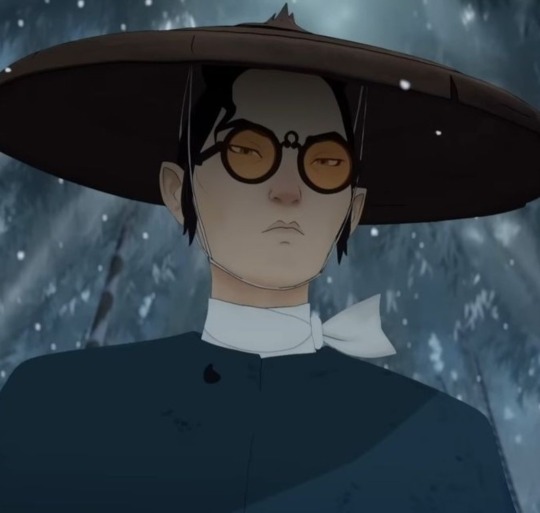
Mizu's masculinity isn't something she dislikes or is seeking to be rid of. Even at her most feminine, Mizu is still androgynous. Not limited by gender performances, stereotypes and beliefs. It's all part of her. The doting lover, the skilled samurai, the knifemaker, the patron of arts. It just creates internal conflict when she's unable to connect to her femininity in a gendered society, knowing that her femininity will be seen as weakness. On the flipside, we know Mizu suppressed masculine parts of herself in her marriage with the expectation that they'll become a deal-breaker which also wasn't healthy. Mizu doesn't need the go-ahead to be traditionally feminine, she just needs space or a person/people who will allow her be herself without nitpicking parts of her. In that vein, I also wanna address how Akemi is also masculine in her own ways.
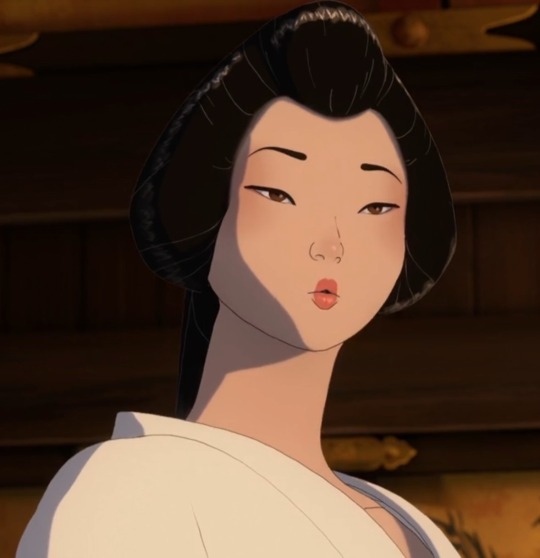
Just because she doesn't wield a sword or has an androgynous bodytype, doesn't mean that Akemi isn't masculine (the social understanding of it). She is very much so in her own right. Seki, her tutor, keeps aligning her with her father claiming that they have the same conviction in their beliefs in which their roots are unshakeable. This lays out how traits of power seeking, ambition, stark independence and intelligence that her father prides himself on are discouraged in Akemi as she's a woman. She is politically informed, highly educated and sexually dominant. She is calculative, express in her expertise at Go, something she's been better than grown men at since she was 12. Seki tells her that beyond just surviving in her marital home, she is equipped to succeed, expand her territory, find people's vulnerabilities, capture and win. That she can learn to do anything she wants and be whoever she wants, even if the goal is to become the ruler of Japan. In that same episode, Mizu is parallel to Akemi where she seeks wisdom from Master Eiji to exact an artful revenge where he proceeds to tell her that he didn't train her to be a demon or a human but he showed her how to be an artist. That revenge, swords, pots, noodles are all the same to an artist. The goal is to learn to be good at something. Anything. Mizu's pursuit of revenge is as masculine as Akemi's pursuit of power. They are both capable of learning. Of being successful. They are both elements of their own destiny. Water. Fire.
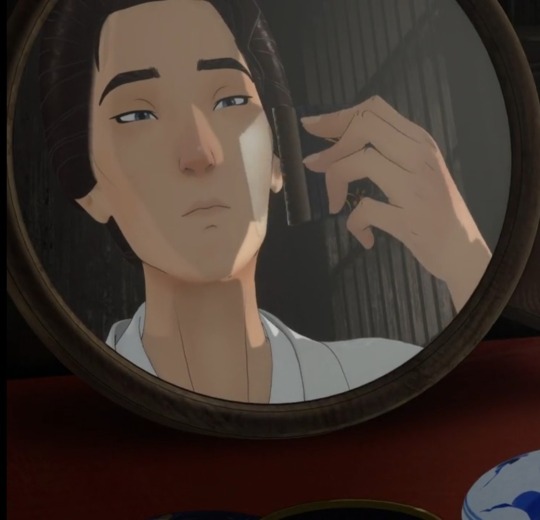
It doesn't matter what the means used are if the objective is one and the same. Akemi learnt this throughout season 1. That to evolve oneself guarantees success over only changing the scenario by running. Like Mizu, Akemi works with what she has. She is feminine presenting, enhanced through the princess finery, she can't fight but she uses her beauty, charm and wit to execute her plans and bend men to her will. Mizu attempted to maneuvere this same tactic after Mikio called her a monster, dolling up like on her wedding day to appease to his masculinity but it only pushed her towards the one thing she does best- wielding a sword to survive. Mizu knows how to fight, that is her agency, not a definitive of her gender. To fight and evolve is human, not select for a particular gender. Akemi also knows how to fight. She's trained in koto playing, singing, dancing, literature, poetry and the sutras. Her modus operandi is to weaken a man through his own hubris of thinking that she presents no threat. Which, as a personal opinion, I find a requires a tad more skill than cutting through flesh and bone. With Mizu, men brace for a fight, with Akemi, they don't even realise there was one in the first place. I posit that fighting is seen as more glorious than manipulation because it's a traditionally masculine way of dealing with things. Meanwhile, artful manipulation if rife with character bashing because femininity, according to some, should not not exist to take advantage only be taken advantage of, which again. Trash take. Needless to say, both Mizu and Akemi easily outclass the men who stand in their way.
Finit
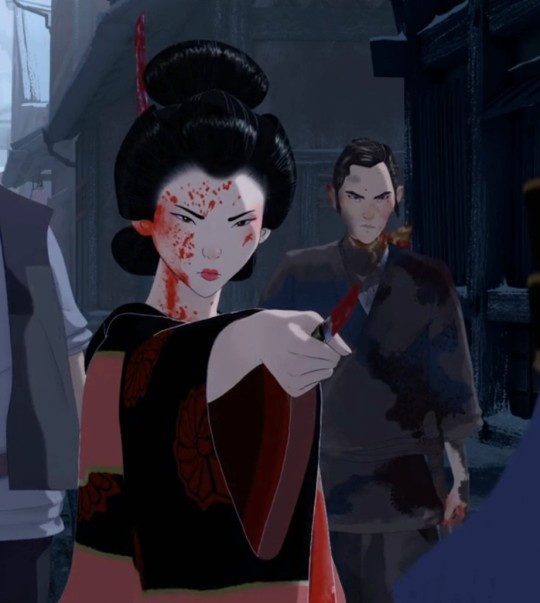
#blue eye samurai analysis#mizu#akemi#netflix blue eye samurai#blue eye samurai#mizu blue eye samurai#akemi blue eye samurai#blue eye samurai mizu#bes akemi#netflix bes#bes mizu#bes#bes netflix#blue eye samurai netflix#akemi ito
184 notes
·
View notes
Text
in episode 2 when mizu is training in the forest during the demon tree samurai montage, the tree samurai have the same clan symbol on their forehead as the men that came to arrest her in episode 5
she can never escape the nightmare that was that day send post
#lillydrawsmizu theory#mizu#mizu bes#mizu blue eye samurai#blue eye samurai#blue eye samurai fanart#bes#blue eye samurai fan theory#bes analysis#blue eye samurai analysis
157 notes
·
View notes
Text
Mizu’s Period
I’m getting kind of sick of the weirdly agreed upon headcanon within the fandom that stipulates Mizu simply must not menstruate very much if at all, solely because Mizu is often injured, possesses a slender build as well as an athletic lifestyle, and in many ways is androgynous in appearance (but that last point is always unspoken ofc).
There also seems to be an odd obsession with using fanon theories that are not directly disproved nor proved in the canon, such as “Mizu never eats enough” as evidence for the Mizu’s Uterus Is Not Like Other Girls Reproductive Organs™️ headcanon, that presumes Mizu is just so special she’ll bleed from everywhere except her pussy.
Like… is it perfectly possible that Mizu does not often get her period due to her extremely active and dangerous lifestyle? Yes, of course! Does Mizu’s slender and athletic frame make this seem like more of a possibility? It could, but her physique in of itself is not “evidence” per say, especially since Mizu’s body looked exactly the same when she was living a much easier and more comfortable lifestyle on the farm with Mikio, and they clearly had plenty of food. Mizu also wasn’t training intensely if at all for the 8-12 months she was married to Mikio. Yet her build remained the same. So it’s perfectly probable that Mizu’s physique is most greatly impacted by her genetics and thus not greatly affected by physical activity.
And for everyone that’s about to shout “but women athletes that compete at the highest levels often loose their periods for a while!” yes absolutely, some of them do. They also work out for 2-6+ hours a day six to seven days a week, use treadmills, bench press, and eat ridiculously curated diets that specifically target certain macronutrients and involve carefully curated portions that must be eaten at the right times on the right days. The fuck makes you think Mizu is doing all that?? My girl inhales whatever food in put in front of her as long as she has good reason to believe it is safe (i.e not poisoned). Do you really think modern day Olympic power lifters, track and field runners, artistic gymnasts and rhythmic gymnasts are all slurping down full servings of soba or dumbplings just whenever? Fuck no. Also, the current top women athletes in the world from the aforementioned Olympic sports I just mentioned, all have vastly different body types. As well as extremely different dietary needs, training routines, workouts, and just plain genetics that would have naturally given them certain bodies regardless of sport.
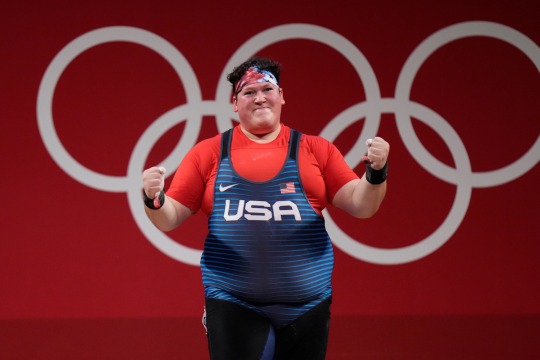

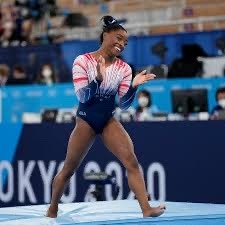
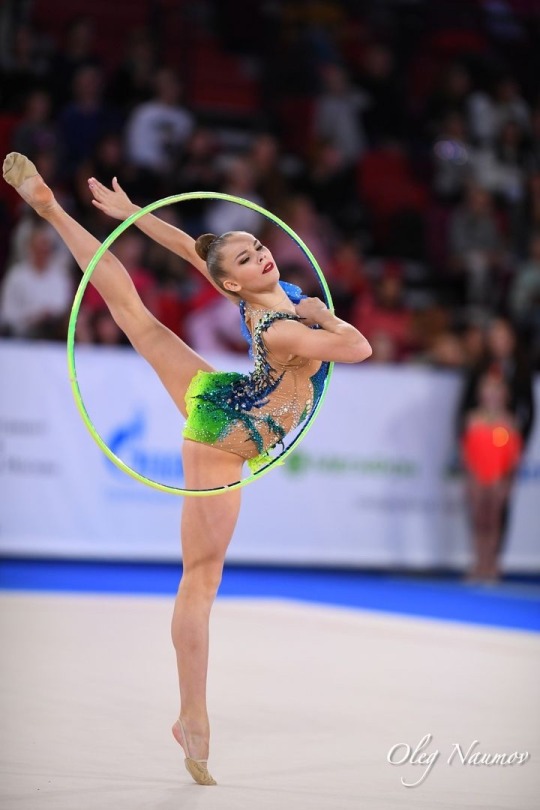
as evidenced by the above photos of various female olympic athletes: power lifter (top left), track and field runner (top right), artistic gymnast (bottom left), and rhythmic gymnast (bottom right).
Mizu is not a power lifter, or a sprinter, or an archer, or anything of the sort. Mizu does not train to be incredible at one thing, nor does she base what she eats or how she trains on when she will be preforming at a specific event (such as Olympians do). She is a swordsman, a blacksmith, and an all around athletic person that needs to stay in a state of constant readiness for any physical activity. Such as climbing, swimming, horseback riding, using acrobatic techniques, performing martial arts, working on a farm, and so much more. All of which is presented in as such in canon. Not to mention Mizu lives as a lower-class individual in Japan during the 1600s. What ever gave you the idea that she was dieting and training like a modern athlete? Mizu is not a sportsman, she’s a killer.
So can we just stop, please? Plenty of people menstruate. Its perfectly normal and natural. And as someone who has been at a much lower weight at different points in my life with less than desirable health conditions (to say the least), menstruation does not magically halt just because you (stranger on the internet) thinks it “logically” should under such circumstances. That’s not how it works. Bodies are weird, and everyone’s body works a bit differently. And if Mizu actually was as sick and muscular and thin as everyone seems to have headcanoned her as, then how the fuck is she mopping everyone she fights? If Mizu is “so active and low weight that she can’t be getting her period” then how do you explain the fact that she is able to preform at peak physical level while being so active? Make it make sense.
And for the love of god, please stop acting like menstruation is “special” or “other” or “weird”. It’s not. Get educated, and get over yourself.
#some of you make the strangest jumps in logic for the iffiest reasons#blue eye samurai#mizu#blue eye samurai meta#mizu blue eye samurai#bes mizu#mizu bes#bes netflix#bes headcanons#blue eye samurai analysis#blue eye samurai headcanons#blue eye samurai theory#blue eye samurai fandom#female characters#afab character#writing women#media literacy#reader bias
109 notes
·
View notes
Text
Review #1.1: Blue Eye Samurai Season 1
A continuation of my initial review. I just cannot stop thinking about this show and the symbolism within it. The parallel between Akemi and Taigen - the show beginning with Akemi searching for happiness and Taigen searching for greatness, and the show ending with Akemi searching for greatness and Taigen searching for happiness. I really enjoy Akemi's relationship with her husband. I think they are a good match. I do hope that Akemi and Taigen do not get together, I am not sure it would be beneficial for either of them, and in fact, I think it would hold them both back.
Another point I have been pondering is Mizu and her refusal to let go of anything. Her clothes are the same she's been wearing since childhood. She collects and keeps items from her past lives, from people left behind. She has never cut her hair - and this is a detail I really like, signifying how much she is holding on to.
#blue eye samurai#review#blue eye samurai review#tv show review#recommendation#tv show recommendations#mizu blue eye samurai#taigen blue eye samurai#akemi blue eye samurai#analysis#character analysis#blue eye samurai analysis
21 notes
·
View notes
Text
"My new Shogun will break open your welded borders. Open Japan wide to the West. We'll flood your land with our people, our music, our shame, our bread and milk until you think an ugly face like mine more beautiful than ur own."
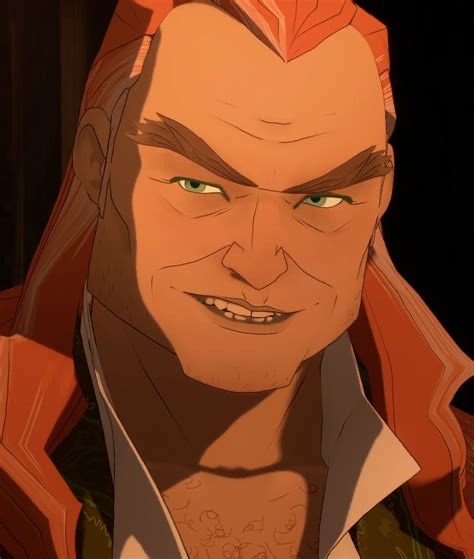
I fear they won... 400 years later...
#blue eye samurai#blue eye samurai mikio#blue eye samurai spoilers#blue eye samurai analysis#blue eye samurai akemi
8 notes
·
View notes
Text
Something really tragic about Blue Eye Samurai I realized
The more conventional take on the narrative of the girl giving a typical domestic life a try would be her discovering that she cannot live a lie and she must embrace her real qualities (i.e. being a warrior).
Mizu doesn't get this though. Her domestic life is never proven to be poisonous, she was willing to play the part of the meek and subservient bride just for a change at meager happiness. And then that all gets snatched away.
She doesn't learn that the domestic life would never have worked for her, she just learns it's not available to her, that she is denied even the self-delusion of fitting in or finding quiet happiness. She learns that all she's ever going to get is revenge.
459 notes
·
View notes
Text
Something cool about Blue Eye Samurai is how sex is juxtaposed with the end-goals.
I really love how our three protagonists are all obsessed. And that obsession defines them, torments them, and are subsequently reborn through their obsessions.
Mizu, of course, is obsessed with the concept of revenge. It's not even about getting even or getting justice as some might use to justify the bloody road taken—it is simply about seeking satisfaction for Mizu. She cuts a bloody swathe across Japan because of what the Four White Devils did to her mother and herself. She does not concern herself with the ramifications of her wrath but merely charges forward, leaving behind a trail of viscera and gore behind her.
Like I said before, her vengeance and obsession with satisfaction is not painted by the show as wrong. It is how she allows it to affect others along the path. It's why the episode with Madame Kaji is so enlightening; Mizu should not tackle this quest as a vengeful revenant; an onryō. She has let the world define her as a monstrosity and so she embraced it, when Swordfather and Madame Kaji knew what the correct path was to satiate her need for vengeance. Treat her sword as the Artisan's tool it truly is. Treat her body the way an Artist would treat their canvas.
Madame Kaji and Swordfather are both outcasts, for being a woman and a blind man. Yet they found strength in their exclusion, becoming single-minded in their fields of art. Because sex is art and swordsmithing is art. It's what makes Mizu's body writing scene so fucking good.
Artistic vision becomes stagnant when one pulls from only one source. They become rigid and unbending when Mizu, like her namesake, must be fluid. She has shown fluidity in her use of her gender and her morals, but cannot apply that same flexibility towards her goal. Throughout season one, she was becoming an uninspired artist, merely painting the world in hues of scarlet. In a world that forces Women to be either Wives or Whores, Mizu chose to be a Warrior—but a warrior fights for a cause, whether it be just or otherwise. A soldier fights in an army. Mizu is neither of these things. She is an Artist first and foremost, and her medium is Death. Sex, something Mizu was at first hesitant before her failed marriage, and something she actively avoided afterwards, is what gives her a new perspective. Like an Illustrator studying life to better draw their intended worlds, taking inspiration from wherever one can find it.
Taigen and Akemi are also equally affected by the artistry of sex, as befitting of Mizu's fellow protagonists.
Akemi is quite obviously Mizu's narrative foil. Mizu chases after revenge like a bloodhound whereas Akemi longs for freedom like a bird in a cage. Both are fierce women who are unsatisfied with their lot in life, with their sex and gender being used against them in their lives. Literally, the episode "The Tale of the Ronin and the Bride" is a fucking triple entendre:
Mizu is the Ronin as well as the Bride.
The play showcases the tale of the Ronin and the Bride.
It is also Mizu as the Ronin and Akemi as the Bride.
And when Mizu finds her center as she melts down her blade and engages in body writing, this scene of enlightenment is juxtaposed with Akemi laying with her new husband Takayoshi. Both, in this moment, are taking control of their lives through sex. They are both taking control of their futures through the ways Madame Kaji taught them. Mizu and Akemi are both rebels against this oppressive society, and are both talented artists with their body. Whether that be sex, politicking, or ass-kicking.
Taigen, like the two women before, finds freedom through it but in a more subtle manner.
Where Mizu and Akemi are narrative foils, both using sex as a form of art and escape, Taigen finds liberation through his awakening.
Like the closeted bisexual man he is, he begins his journey of self-realization when he first encounters Mizu at the Dojo.
Every single battle these two have is purposefully rife with sexual tension. All his life, Taigen has been taught that a man must live with honor. That he must take control of his life and his identity, or he will have failed and that he is better off dead than to live with such shame.
Taigen is just as much a victim of the Patriarchal society around him. Mizu rails against it violently. Akemi seeks to run away from it all. And Taigen, with the privilege given to him by his manhood, chooses to become a perpetrator, enabling the vicious wheel of society to keep moving forward.
His obsession with honor leads him to hunting down and even protecting Mizu. Mizu is no doubt the better warrior, but even she knows she owes so much to Taigen. The blockhead not only did everything to protect her in the valley, but also sealed his lips shut even under the duress of torture. His obsession with honor becomes an obsession with Mizu.
His regrets over tormenting her over her looks and ethnicity as a child. His shame in having lost so decisively in his own dojo. Taigen was a man born with nothing and climbed up to the top with every advantage he could muster, and suddenly it's all ripped away by this one vengeful spirit passing by.
Taigen learns to surrender control around Mizu. He begins to discover his own sexuality and purpose around Mizu, redefining what honor really means to him now that he, as a man, has a budding attraction towards the man who beat him.
Mizu's Vengeance. Akemi's Freedom. Taigen's Honor. In all three, Sex becomes a catalyst in redefining what each of these concepts truly mean to them all. It's not just sex of course, but it is undeniable how the writers keep juxtaposing sexual acts and thoughts with massive character moments.
It changes how Mizu chases after her Vengeance. It recontextualizes how Akemi can be Free. It showcases the absurdity of the Honor forced upon Taigen.
It's so fucking refreshing seeing Sex not used as fanservice or shoe-horned in just to further a stale, poorly written cis-heterosexual romance; but used as a plot point that cannot be ignored. An impetus that fuels the narrative.
Moving forward, I'm curious as to how sex will be used.
The next few ideas aren't as sound or organized because I'm neither Asexual nor Genderfluid, so please if anyone reads this who understands it better, feel free to point it out.
I think it'd be cool if Mizu met the inverse of Madame Kaji. A person who is apathetic to sex. Sure, Swordfather has shades of this, but I'm tired of the person with disabilities also being on the Asexual spectrum. And I'm not saying that Ace or Graysexual people with disabilities don't exist! But they always tend to be written as having some form of disability (Varys from ASOIAF) or a Robot.
Just as artists need a variety of sources to pull inspiration from, I hope in the next seasons we get to see different perspectives on sex and gender. In London, it feels like Mizu finding the other half of herself, and with that having a better way of tackling her own identity. Whether it be gender, sex, combat, etc.
Basically what this inane rambling amounts to is that Blue Eye Samurai tackles sex and violence and revenge and obsession in ways that most media has yet to truly do. So that was pretty cool.
#blue eye samurai#blue eye samurai spoilers#blue eye samurai season 2#mizu#mizu blue eye samurai#akemi#taigen#metal#media analysis#character analysis#blue eye samurai meta#netflix are cowards for not announcing season 2 immediately#come on dickheads#the fans and the creators have been fighting for the green light#hand it over#you cocks#paprikash ramblings
561 notes
·
View notes
Text
Thinking about the crazy love triangle situation in Blue Eye Samurai and debating heavily with myself on how I'd like to see it conclude. And yeah this discussion can be thought of purely as shipping, headcanons, and fandom fun. But when analysing the show and engaging with it in a more in-depth, almost-literary level, it's impossible to dismiss who Mizu's potential love interests are and how different endgame romances would affect her character arc and the overall story and themes.
So in this post I'd like to look at the love triangle a bit more closely, and speculate on where the story will take this.
DISCLAIMER: It is my personal interpretation of the text that Mizu is non-binary—I use this as an umbrella term denoting any gender that does not adhere to the binary restrictions, norms, and expectations of what it means to be either a man or woman in a particular society; it's not just an androgynous "third gender" that exclusively uses they/them pronouns. Thus, while I personally believe Mizu is not strictly a cis woman, she does still identify with womanhood, despite definitely feeling a level of detachment from it due to living as a man for so long. With that being said, I will be using she/her pronouns for Mizu in this post, but please note that this is purely personal preference. Everyone is free to interpret the text the way they like. That's the fun of fiction. Now, without further ado, let's proceed.
Okay so, thinking about the pairings on a purely surface level, and even before i got into the show, I was pinning my hopes on some lesbianism going on between Mizu and Akemi, and the show does hint at this; in Ep1, during their first encounter in Kyoto, there is the famous slow-mo shot of their eyes meeting, Mizu's lips slightly parted as she is unable to tear her gaze away from Akemi, while sweet string music plays in the background. This is clear romantic framing, and a marker of attraction. If Mizu was a cishet man, there would be no question that this is a potential love interest.
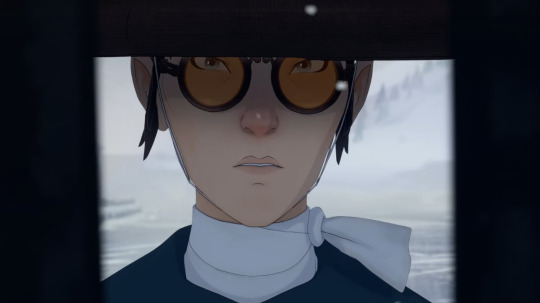
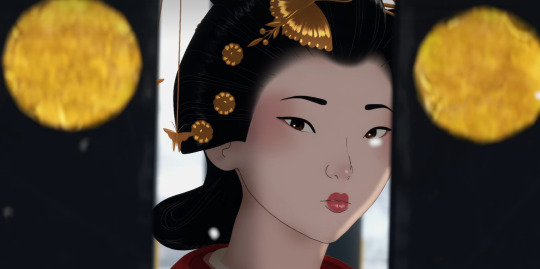
But then, in the same episode, we meet Taigen, who is introduced to us firstly from hearing Akemi's father describe him as "a fierce and undefeated young samurai", the "best swordsman in the best school" and "a fisherman's son from Kohama [...] whose rise reminds [him] of [his] own."
In the next scene, we meet him in person as Akemi's fiance, and he seems sweet enough. He even gives her sweets! In exchange, Akemi gives him gold, and he feels a bit ashamed that he doesn't have anything better to offer her. But Akemi accepts him and his gift wholeheartedly and flirts with him a little, which makes him smile kinda shyly.
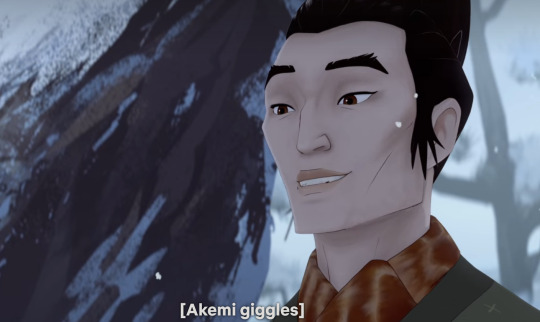
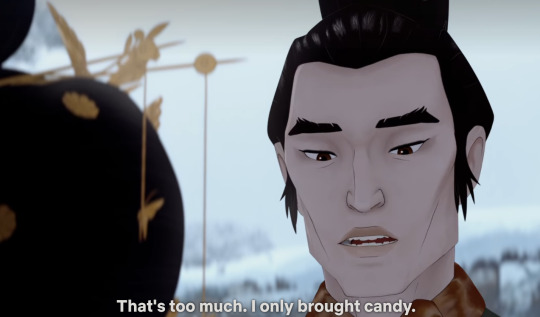
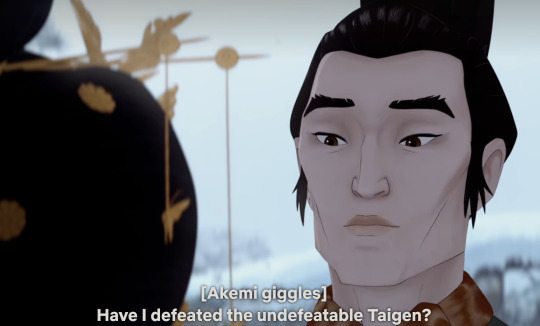
When Akemi confirms their engagement, Taigen is in disbelief because he has no status or noble background, but Akemi reassures him.
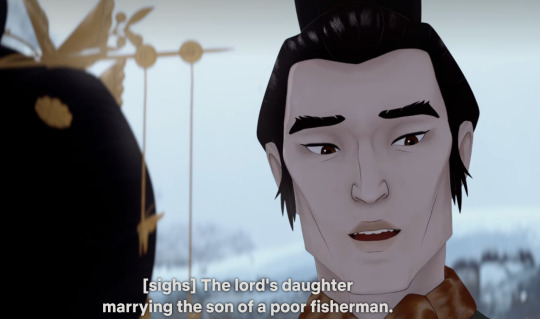
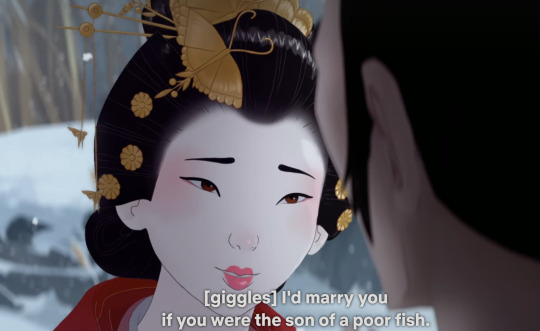
So from these first few scenes, we're introduced to Taigen as an honourable and strong samurai, but also as a man who is sweet and gentle with the woman he is about to marry, as well as aware of his own inferiority when compared to Akemi's high station.
Our view of him then changes as his true self is revealed: he is an arrogant and smug bastard among his peers, but more importantly, he is the terrible bully from Mizu's childhood.
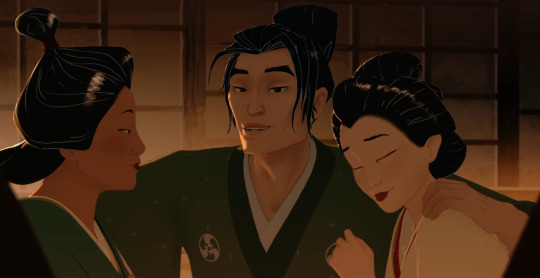
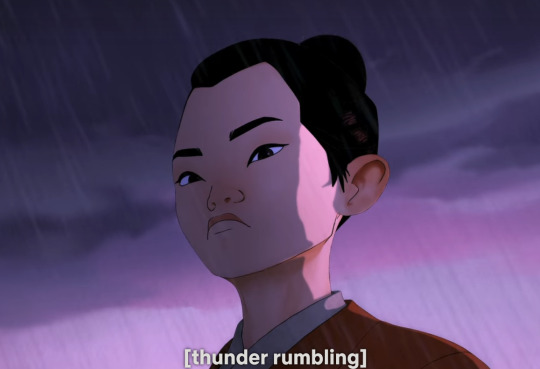
And it is this side of Taigen--pompous jerk and unrepentant xenophobic bully--that we continue to see as the show goes on, and it's safe to say that this is his real self, sans any pretense of humility and modesty. Around anyone who isn't an outright superior in terms of class and power (ie. Akemi's father, the shogun), Taigen never hesitates to assert his own authority and "greatness."

But as the show goes on, he gets caught by Heiji Shindo's men, and then tortured. And that's when we see, okay, turns out he's not that bad. He's honourable; "honour" is not just meaningless and superficial pedantry for him, but an internalised, guiding principle.
He was a cruel asshat throughout Mizu's childhood, but in a prejudiced and xenophobic society, he was just playing by the rules. As a child, he knew he was at the bottom of society, but when met with someone even lower ranked than him (Mizu), he can project all those prejudices and insecurities onto someone else. This way of thinking--"if you can't beat 'em, join em"--is what allowed him to climb up the ranks despite being some dirt poor kid from an abusive household*.
*Well, that combined with his cismale privilege of course, because this would not be an option for a woman in similar circumstances.
Thus, his upholding of honour also exemplifies how Taigen embodies the ideals and rules of his society. His insistence on duelling Mizu is another more blatant example of this. He doesn't want revenge like Mizu does. He wants to be accepted by society, within the bounds that society has placed, and that means that his only two options following his defeat at the Shindo dojo were to either chase Mizu down and get his damn duel, or kill himself for his humiliating defeat.
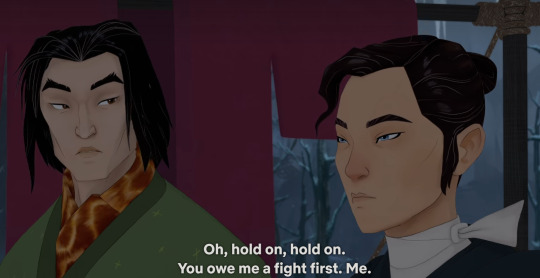
Now! Moving on from Taigen, let's go back to the other end of this little love triangle: Akemi.
Mizu and Akemi only properly meet in Ep4. During their first meeting, when Akemi tries to poison Mizu in Madame Kaji's brothel, she compliments Mizu's eyes, calling them "beautiful."
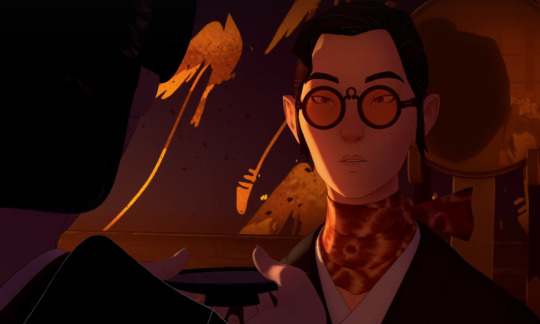
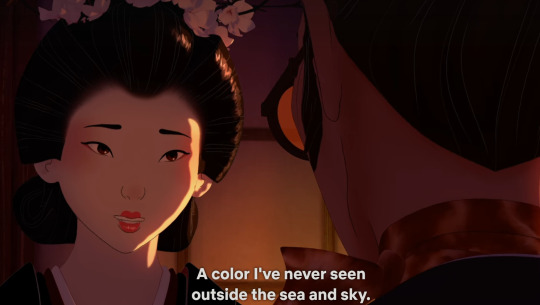
This seems to genuinely take mizu off-guard for a second before she coolly plays along. We know that Mizu recognises Akemi from the get-go, and thus sees through Akemi's ploy from a mile away. It's also safe to assume she'd expected false flattery, because Mizu understands full well that this tactic is how women get what they want: by using their 'feminine wiles' and playing up their naivety and innocence. But even so, it's interesting that Mizu actually seems surprised by Akemi's compliment.
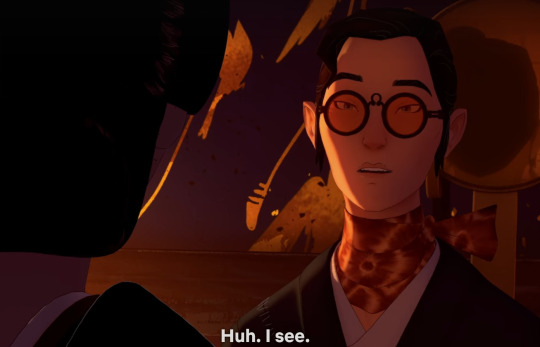
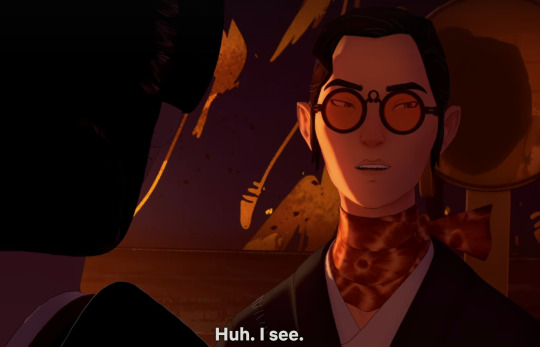
Then, after Mizu subtly taunts Akemi by lying about Taigen's death, she and Akemi have a bit of a scuffle, and then we get to Mizu saying this:
"Women in our world don't have a single good option. Except you, like some magical forest creature. You could have anything you want, but then you beg to eat trash."
(no screenshot because it's quite a long line but you get it)
Here we see Mizu's opinions on the marginalisation of (mostly poor and under-privileged) women stated outright, and underlying her words is also resentment. Because even though she and Akemi have shared experiences of female oppression, Mizu, unlike Akemi, was also poor, from a rural village, and is a racial minority. Mizu is triply oppressed, while Akemi only faces one primary form of oppression, and to someone as embittered by the world as Mizu is, to see Akemi "beg to eat trash" is a slap in the face, practically tone-deaf to the other injustices around her--injustices which Akemi has not shown much, or any, acknowledgement for at this point.
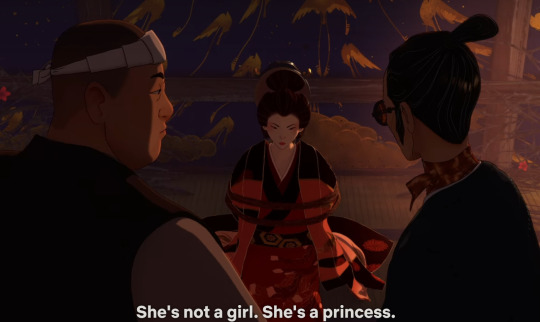
Then, after this scene, Mizu kills Kinuyo, and this unsettles her to a degree we've never seen from her before. She is visibly distraught, and the entire sequence hammers the theme of this episode (and arguably, a large portion of the show) into our heads: women in this world suffer. And even though Mizu is well aware of this fact, to commit this act is so visceral that is shakes her to her core, and it's what ultimately leads to the ambush of the Thousand Fangs.

But before the ambush, Mizu and Akemi talk a little again, and during this time Akemi taunts Mizu some more.
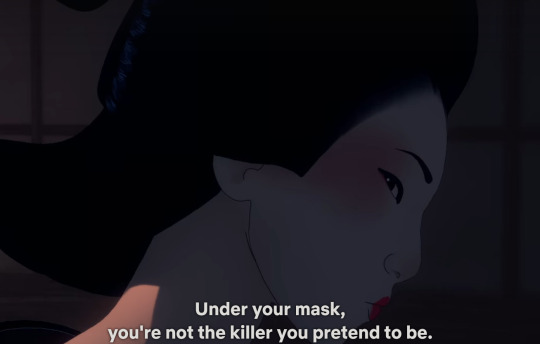
Right now, Mizu is exhausted to the point where (I believe) she even downs some sake, despite not usually drinking. Thus, worn down, she cuts Akemi's ropes and tells her, "Just go." Akemi recovers from her initial fear of Mizu's blade and taunts her some more, accurately seeing through Mizu's facade of coldness, recognising the raw anger there, and says this:
"I thought you had to be something special. Your face isn't even so scary. You're just... angry."
At this, Mizu is amused and compares Akemi to Taigen ("I see why he likes you. You're just like Taigen when we were children. A fucking brat.")
The reveal that Mizu and Taigen knew each other in childhood surprises Akemi, but before either of them can say more, everything goes to shit.
That's when we get to Ep5. This episode focuses primarily on Mizu, the central piece of this love triangle, and does the most out of all the episodes to shed some light on her character and goals, fleshing her out to be more than just the vengeful, highly proficient samurai we've seen thus far (symbolised by The Ronin), but also a person who is capable of love, domesticity and gentleness (symbolised by The Bride). But in the end, Mizu rejects both these ideals, instead becoming an Onryo, who is neither guided by pride/honour, nor love.
By 'reincarnating' into an Onryo, Mizu is able to win the day and save the women in the brothel. However, as she has now fully embraced her status as an Onryo, and is exhausted physically, mentally, and emotionally, she lets the Tokunobu clansmen take Akemi away while Akemi's screams echo in her ear.
Mizu says this choice is for Akemi's own good, that Akemi's better off; because Mizu is jaded and weary, and cannot afford the luxury of idealism, and thus must always be strictly practical and realistic. So of course that's why, in her view, yes, Akemi should not be wasting her time in a brothel where women are exploited and abused, nor should Akemi be so naive to think that her marriage with Taigen is even still possible. However, regardless of Mizu's views, it is not for her to decide, because though Akemi is privileged in some sense, she is still trapped and voiceless, and deserves the right to choose her own destiny.
But as it happens, in the end, though Akemi did not choose who she gets to marry, she DOES get to choose her next move when Edo burns down.
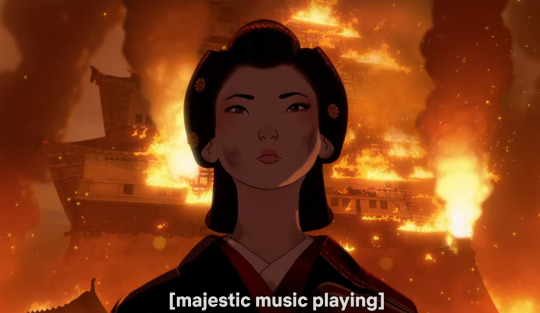
"I want to be great."
This one line is the key to her entire arc, which is only just beginning. We see she quickly has acquired the affection and good graces of the shogun's son after their wedding night and consummation, and with Madame Kaji and the girls now serving her, Akemi will only grow to become a prominent political player.
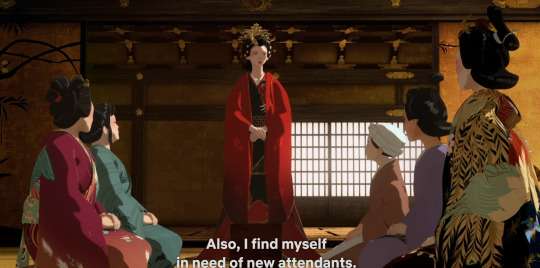
NOW, only after analysing the characters as they are within this season, only can we speculate how their arcs will continue as the show progresses.
First and foremost, I will reassert the popular opinion that Mizu and Akemi are foils. The climax (pun intended) of Ep7 illustrates this as it parallels the turning points in both Mizu's and Akemi's arcs:
Mizu melts the steel of all her loves and shames, the people she's collected: the broken blade wielded by both Chiaki and Taigen, Akemi's knife, Ringo's bell, Master Eiji's tongs - this symbolises her beginning to accept herself, and in doing so, also accepting the help of others;
Akemi consummates her marriage with Takayoshi Itoh, gains his affection, and cements her position as a woman in the shogun's palace - this symbolises her taking charge of her situation, no longer playing the damsel, but using her position to her advantage, empowering both herself and the underprivileged women around her.
These are thus two directly contrasting, diverging journeys:
Mizu's arc moves inward (yin). It is an internal path of self-love and self-discovery, focused on finding peace and tranquility inside herself, and this involves allowing herself to let others into her life, opening herself up to friendship and empathy once more.
Akemi's arc moves outward (yang), it is an external path of growth, transforming from a naive, caged princess to a powerful woman and a force to be reckoned with.
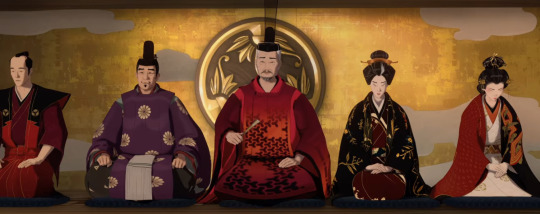
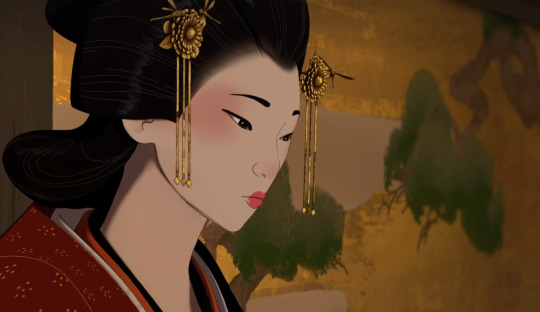

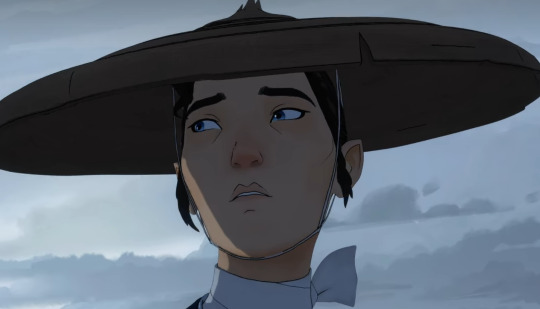
Akemi is always dressed in red, even her eyes are a bit of a reddish-brown rather than brown-black like most other characters, and in her penultimate scene she stands against a backdrop of flames. She is fire: quick-tempered, passionate, full of energy. Red is powerful, authoritative, and in eastern cultures, it is associated with prosperity.
Mizu is blue: her eyes, her sword, her clothes. She is also named after water; it's where she goes to recover, reflect and meditate. Water is fluid like a brook weaving around a stone in its path, always changing and adapting, it is graceful, it is beautiful and ruthless, tranquil yet swift.
Thus, in the future, I expect we will see plenty of political manoeuvring and intrigue in Akemi's plotline, where she fully embraces control of her life, and begins to take action to help others as well, realising that her own oppression is just one piece in a much larger picture. Her main conflict is with society.
In direct contrast, Mizu's main conflict is with herself. She must realise that her desire for vengeance is a projection of her own deep-rooted self-hatred. Her arc must move towards unpacking her feelings and trauma so she can be at peace with herself and allow space for love in her heart. Because as we saw in Ep5, Mizu had come extremely close to achieving peace and joy, as she had not only loved Mikio, but also had briefly believed that Mikio had loved her (and accepted her for who she is) as well.
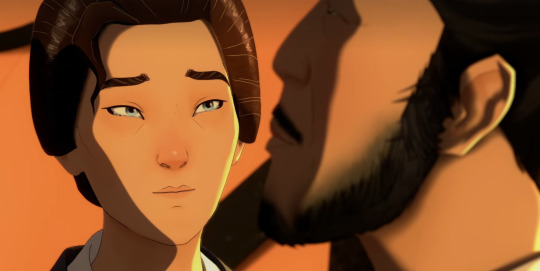
Thus, assuming the story is not planned as a tragedy, Mizu will likely end up getting her vengeance, but it will not satisfy her, because it is not what she needs. What she needs is to let go of the Onryo within her and to reconcile both The Ronin and The Bride within herself, as she is both a fighter and a lover, but not a monster.
(Edit: I recommend checking out this post by @stylographic-blue-rhapsody for a much clearer analysis about Mizu'a symbolism as Ronin, Bride and Onryo!)
And now that we've mostly covered each of the characters individually, we can finally get to the main point of this post: the love triangle.
--
Let's talk about Option A: Akemi.
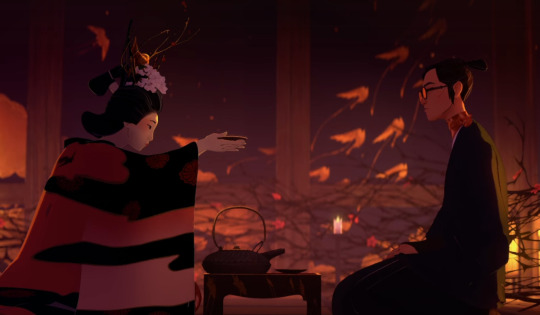
As I covered extensively earlier, Mizu and Akemi are foils, a yin-yang pair. But while they play off each other very well in a thematic sense, I personally believe that a serious romance between them will be more complicated if they become endgame. This is because Akemi's natural resolution is to embrace a position of power and influence, where she has both freedom and control over herself and to make much-needed changes in a prejudiced society. Meanwhile, Mizu's natural resolution is the opposite; her happy ending would to find a peaceful life where she is safe and free from prying eyes, and able to be her true self.
Thus, it would make very little sense for Akemi to forfeit power and run away with Mizu and start a humble life together. Akemi wants to be great, and that is absolutely what she deserves. On the other end of the spectrum, it would also make little sense for Mizu to dedicate her life in service of Akemi, such as acting as a bodyguard or something similar, because a life in a palace full of court intrigue and conspiracies is far from what Mizu needs to be happy.
With that being said, if Mizu/Akemi is endgame, and assuming their overarching character arcs do not shift directions, their love story would likely be either tragic, doomed, or bittersweet. I do absolutely love this type of story because personally I'm a sucker for catharsis, so it would be very interesting if the writers do decide to take this route.
Also, as a note, please do not take this as me dunking on this pairing. This is just my personal opinion and analysis and I completely understand if you disagree!
--
Then, of course, we have Option B: Taigen.
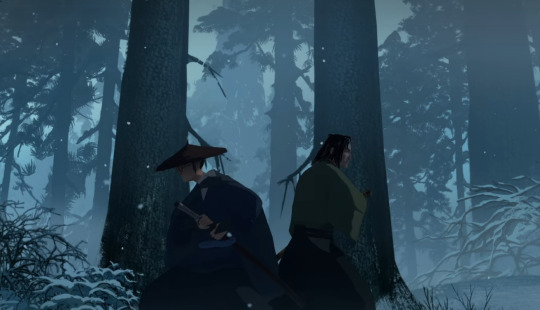
Between Akemi and Mizu, Taigen is a bit of a free-floater here, because Season 1 leaves off at a point where his arc is very ambiguous as to where it's headed. While Akemi climbs for greatness and Mizu goes on a journey across the ocean to (presumably) discover more about her heritage, we have little clues about where Taigen is headed. And if I'm being honest, I'm sure he has no idea either! He still hasn't reclaimed his honour, so he would be unable to rejoin the Shindo Dojo; he's been rejected by Akemi; and while he showed loyalty to the shogun, the shogun is now dead, and all the shogun's men who had witnessed his "humiliating" death were left to die by Lady Itoh, who is now pulling the strings within the palace.
Therefore, Taigen has very few options here.
And when considering his role in the story is as Mizu's begrudging ally, his arc will undoubtedly be focused on unlearning his xenophobia and misogyny, the latter of which we have not seen yet, but is surely present. Now, whether he will do this in Mizu's presence or absence will be unknown until we see Season 2. Following the Season 1 finale, he might return to Kohama and wait for Mizu there as he learns humility and remorse over his past cruelty; or maybe he will follow Mizu to London, and the two of them will continue to butt heads until he finally admits to himself that he cares for Mizu more than he would like to admit. There is no room for doubt that his growing feelings for Mizu are more-than-platonic, because we all saw him get turned on by sparring with her in Ep7 lol. Thus, regardless of the exact choice he makes, I am sure that his overall arc will be focused on redeeming his character.
Now, when it comes go redeeming him, I know there are many who simply don't want him redeemed because he was such a jerk to Mizu, and while yes I agree he was awful, I do believe there is also nuance to his character.
Previously I've discussed in great detail the colour and elemental symbolism with Mizu and Akemi, but have yet to touch on how they relate to Taigen. So, let's talk about that for a second.
While Akemi is red and Mizu is blue, Taigen is green.

Green is a complementary colour to Akemi's red. Complementary colours are directly opposite each other in the colour wheel; when mixed, they neutralise each other, but when put side-by-side, they form a pleasing and impactful contrast that boosts the brightness and prominence of both colours. This mirrors Taigen and Akemi's relationship. They are an "ideal" pair because they complement each other very well, and bring out each other's most prominent traits. Mizu's comment about their similar "brattiness" comes to mind here.

Green is also an analogous colour with Mizu's blue. These colours are sitting right next to each other on the colour wheel; their natural similarity makes it easy for them to form a cohesive overall appearance, but using both in equal amounts will make a design overwhelming and too busy. Thus, the best way to use analogous colours is to make one the dominant colour, while the other will serve as an accent. I feel this also speaks to the dynamic in Taigen and Mizu's relationship. They came from the space place, both from nothing; they're both strong fighters who love the sport, and work well together when fighting side-by-side; however, they butt heads too easily, mirroring how analogous colours can be too overwhelming when used in equal amounts. Thus, to work together in harmony, one has to be the dominant colour, while the other serves as the accent. In this case, the dominant force would be Mizu, as she is the protagonist of the story, while the accent would be Taigen.
By fulfilling this role as an "accent" to Mizu, Taigen's character would easily be slotted in as a the love interest. This is in contrast with a Mizu/Akemi relationship, whereby Akemi is Mizu's foil before she is Mizu's love interest. This is because, by being a love interest, a character usually takes a backseat in the story, serving the plot and the themes by playing a purely supportive role, and this is not possible in Akemi's case because her character exists to parallel and contrast Mizu (red and blue), and not to support her.
It is possible to serve as a supporting love interest in Taigen's case however. And this is because he, unlike the other characters, does not currently have a definitive place within the story. He initially served the plot as an antagonistic force, but now as he is slowly unlearning his prejudices and becoming a better person, he can no longer serve the story by acting purely as a rival.
Instead, he will serve the story by literally supporting Mizu. And this relates to Taigen being earth, which is steady, firm and reliable, unwavering in loyalty and principles, hardworking and rooted in stability, which is seen in Taigen's staunch and inflexible obedience to the traditions and rules of society. These traits are what make him a perfect samurai, but not a good man. However, unlike most people in their world, Taigen is still capable of change and redemption, which is why Mizu says that he has the potential to be great. Not great by way of power or glory, but great in character. Already, he is honourable to a fault, and does not betray Mizu even after she technically robbed him of everything he was striving towards. And when he was shot by an arrow in the chasm, he did not hesitate a second to tell Mizu to use him as a human shield and save herself.
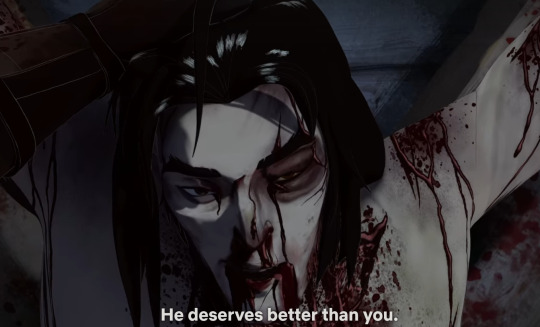
The trigger for his redemption is Mizu. If she had never beat him in that duel, Taigen would live on to become a man like Akemi's father. Cruel, power-hungry, controlling, conservative. But through Mizu, Taigen's sharp edges are ground down, much like water that wears down the stones in a river.
Where Mizu and Akemi's possible love story would be a clash of wills, full of passion and even heartbreak, a possible love story between Mizu and Taigen would be the wearing down of souls. Mizu would make Taigen a better person, and in turn Taigen would dedicate his full respect and support to Mizu as his equal, thus getting her to slowly open up and love herself. Already, Taigen has grown enough to admit (begrudgingly, and in his own Taigen way) that Mizu is better than him; though, clearly, he still has a long way to go, as he still calls Mizu a demon shortly after that.
But basically, Taigen is a very simple man (his main goal now is "to be happy"), and Mizu has great depths that he cannot yet fathom. For this love story to work, it has to begin with Taigen changing for the better. If he succeeds in that, and is able to accept Mizu for all her complexities, I believe that they will make a formidable pair. And though he'd likely still throw a jab or snarky remark at Mizu every now and then, I think he'd come tl wholeheartedly admire Mizu as a brilliant swordsman and a kind soul. Thus, should things work out and this be endgame, Taigen would be able to provide Mizu with what Mikio could not: an idyllic life that is not built on a lie, but mutual trust, respect, admiration, and equality.
Or hey, maybe they could both make their own dojo together! I don't know.
(Edit: This post by @rinandsketches does a great job at delving into Taigen's character and a potential Mizu/Taigen relationship if you'd like to read more about this angle!)
--
Now, as I move on from Taigen, there are a couple more options on how to resolve this love triangle and that includes Option C: Ringo.
In this option, Mizu does not have an endgame romance with either Akemi or Taigen. In this route, she finds peace and love through friendship, solidarity, and a found family between herself, Ringo and Master Eiji—a bunch of outcasts in society who make a strong trifecta of sword-makers.
Also, as an aside while I'm talking about Ringo, I'd like to point out that I believe his element is air and his colour is a neutral grey; he is talkative, easy-going, wise, curious, light on his feet (stealthy) and free-spirited, which are all traits linked to air, and traits that complement Mizu nicely, as he is capable of getting Mizu to open up and trust others again, while Mizu helps him reach his true potential for greatness.
--
And finally, there's Option D: Polyamory.
This is basically an "all of the above" option, in which everyone wins and it's a super duper happy ending. It would also be awesome to get some polyamorous representation, and seeing the dynamic between Akemi/Mizu/Taigen play out would be very entertaining and refreshing. So, you never know, this just might be the true endgame!
--
AAAAND with that, I close my extremely long analysis of what is essentially Mizu's love life. Whatever the final outcome of this love triangle though, I just hope it will be well-written and satisfying to all the characters' respective arcs. (Also I just want Mizu to be HAPPY goddamn it because she deserves the world and her coochie eaten out)
Now, I highly doubt anyone will read any of this (especially not until the end!) but that's fine. I just have so many thoughts and feelings about this show and I just needed to get this out of my system lol! But if by some miracle you did read this far, I wholeheartedly welcome any sharing of thoughts and ideas because man am I obsessed with this show! But of course, if we have an opposing opinions, please be respectful when letting me know; I am very open to friendly discussions.
#blue eye samurai#mizu x taigen#mizu x akemi#mizu blue eye samurai#mizu x akemi x taigen#blue eye samurai meta#also if you ask me PERSONALLY. based on my own analysis which you can read above. personally i'm placing my bets on option b (mizutaigen)#and this is simply bcs i think mizu deserves nice things and that includes getting dicked down and pampered and worshipped#whoops who said that#also mizu deserves to live a life where she can hand taigen's ass to him on a daily basis. ykwim.#BUT i am def open to a change of opinion regarding the mizuakemi rship as the story progresses#i just dont want the writers to reduce akemi into nothing but a love interest for mizu#the only way i can see a happy mizuakemi endgame scenario is if blue eye samurai becomes purely an angsty romance story#in which case then yes i fully endorse the akemi ending <3#but that would probs require a whole genre overhaul? bcs currently the show is firstly an action-epic where the romance is just a subplot#but even tho i dont reeeeally want a mizuakemi endgame i still DEF want mizu & akemi to be romantically and/or sexually involved plsss <3#like they cant have that slow-mo shot between the two of them as their first encounter and NOT DO ANYTHING W IT!!!#also i want mizu to be at LEAST a little sapphic plsplspls#shut up haydar#meta dissertations.pdf#haydar's fandom posts#i wrote this whole thing while delirious and covid positive
357 notes
·
View notes
Text
[spoilers for blue eye samurai ep 5]
what really breaks my heart is that mikio probably never loved mizu, he loved the grateful and humble housewife he wanted for himself. he loved showing off, pretending like he is this honorable swordman when he actually diserted when he had the possibility to fight, and i believe he loved mizu to the extent she could appease his ego. when mizu falls in love with him (and i think that if mizu loves someone, she loves them wholeheartedly) and she allows herself to be vulnerable and she tells him that she can use a sword, he asks her to show him because deep down he doesn't take her seriously.
during their sparring mikio is forced to understand that mizu the woman and mizu the wife arent the same person at all. she is an amazing fighter despite being self-taught, she is probably more skilled than most men will ever be and thats very different from the imagine of the humble bride mikio has in his head. he couldn’t accept that. and whats truly heartbreaking is thar mizu was finally happy for the first time in her life. she was playful and serene and she probably thought she found her place in the world. somwhere she was loved and didn’t have to hide and maybe she could have had her own family. but she couldn’t because mikio never loved her in the first place. he only loved himself.
#blue eye samurai#mizu#mizu blue eye samurai#bes#bes mizu#mikio blue eye samurai#character analysis#just my opinion
167 notes
·
View notes
Text
I was deep in my drunk feelings when I made a joke post threatening to write about episode 5 symbolism and mizu, but then enough people said "where is the essay" so I am here to ramble as requested
in ep 5, the tale told in the puppet show spliced with the flashback sequence of mizu’s marriage identifies mizu as not only the ronin, but also the bride and, with tragedy, the onryō. I would argue that mizu is also depicted (in a less linear fashion) as the phoenix itself, and will circle back to this thought later
mizu is first presented as the ronin, the warrior with a singular purpose. as the ronin’s lord is assassinated by the rival clan, mizu’s mother is killed in the house fire. the ronin swears his revenge, and dedicates his life to this cause. through his childhood and into his young adult life when he departs from swordfather, mizu is exclusively the ronin. he is not the onryō yet, demonstrated in his honorable unwillingness to harm the men who stab him and throw him out of the shop even after he insists that he wasn't looking for a fight in the first place
the ronin is only able to rest and put away his mission when he meets the bride, the lover. however, mizu’s bride is not literally another person she meets. the bride is not mama, or mikio, but the lover mizu discovers in herself, the one allowed to bloom in place of mizu-as-ronin. mizu’s growth into the bride from the ronin occurs over time, but solidifies in the moment when kai is gifted to her by mikio, paralleling the taming of her own distrust and expectations of being hurt. (side note, giving a nod to effective use of color: the bride puppet, dressed in reds and oranges, has matching coloring to the gifting scene, as it takes place in autumn)
mizu’s transformation into the onryō happens in two parts, beginning with the slaying of the bride and completing with the slaying of the ronin. the betrayal by mikio and mama kills the softness in mizu, kills the lover she has allowed herself to become. mizu-as-onryō retaliates by killing the ronin: the part of himself that hesitates before striking, that part that cares for honor. in not intervening in mama’s death and then murdering mikio in turn, mizu kills the ronin in himself, slaughtering it in retribution for the dead bride
mizu is both the bride and the ronin, peaceful lover and noble warrior, until he is not—he is the onryō, only the onryō. episode 5 opens with the narrator saying, “no one man can defeat an army, but one creature can.” only as the onryō, and not as the ronin or the bride, does mizu have the force of will and capacity for violence it takes to singlehandedly overcome boss hamata’s thousand claw army and protect the brothel
mizu’s identity and place in the world is a constant dialogue. he is too white to have a respectable place in japanese society, but is also seen by abijah (our stand-in for white british society) as filthy and corrupted. he is not perceived as enough of a man to walk through life wholly as one (madame kaji’s comments about his apparent lack of sexual desires, his bones breaking “like a woman’s” under fowler’s hands, his disregard for honor and recognition as a samurai). she is also not enough of a woman to exist peacefully as one with mikio (she is a swordsman, an accomplished rider, bad at domesticity; “what woman doesn’t want a husband?” mama chastises)
the moment when mikio rejects her completely following their spar is a particularly poignant narrative beat about tolerance of “the other” in gender presentation: mikio can accept her as a woman only until she bests him at manhood, at the sword, at violence. she is Other in that she is physically strong, a poor cook, able to wield a sword. these traits are all tolerable to mikio, also an outcast, so long as she is not so Other as to be a man. but her swordsmanship bests his, and bests his in the way the sun outshines a candle. it is too Other, and therefore she is not a woman. she is a monster to him, the onryō, even before she kills the bride and the ronin in herself
(( as an aside, this series does a very good job at discussing the oft-challenging relationship between race and gender (e.g. that it is difficult for mizu to live as a biracial man, but would be deadly for her to live as a biracial woman), and demonstrating how queerness of identity complicates that relationship even further—but that’s a topic for a different post ))
as the narrative has been building on this idea that mizu is both the ronin and the bride, the man and the woman, japanese and white, episode 5 concludes with the heartbreaking reveal that, although mizu is all of these things simultaneously, he has had these identities beaten out of him by tragedy and cruelty and his own self-loathing hand
but mizu does not stagnate as the monster. we return to the metaphor of steel: too pure and it becomes brittle, breaking under pressure. mizu is a sword, a weapon that he has forged for the sole purpose of revenge and blood, but he has excised too much of himself to successfully deliver on his goals—he is not the ronin or the bride, he is the onryō; she is not a woman or a man, she is the onryō; the onryō is nothing but pain and vengeance—and so it breaks
“perhaps a demon cannot make steel,” mizu says. “I am a bad artist”
swordfather replies, “an artist gives all they have to the art, the whole. your strengths and deficiencies, your loves and shames. perhaps the people you collected… if you do not invite the whole, the demon takes two chairs, and your art will suffer”
to be reforged, mizu must not only acknowledge the impurities she has beaten out of her blade, out of herself, but lovingly, radically accept them and reincorporate them into the blade, into herself. he adds impure steel—the people he has collected, with their own dualities—to the sheared meteorite sword: the broken blade that fit so perfectly in taigen’s hand (the archetypal ronin, but a man seeking happiness over glory), the knife akemi tried to murder mizu with (the archetypal bride, but with ambition for greatness), the bell given to ringo and returned to mizu in broken trust (the man unable to hold a sword, but upholding samurai principles of honor and wisdom), the tongs that honed mizu’s smithcraft under swordfather’s guidance (the artisan, a blind man who sees more than most). to make of herself a blade strong enough to see her promises through, she must hold her monstrosity and honor and compassion and artistry in equal import
she is the onryō, and the ronin, and the bride, and all the people she has collected.
with this we finally come to mizu as the phoenix. mizu undergoes many cycles of death and rebirth, both in the main storyline and the flashbacks into her life leading up to the present. often, mizu is juxtaposed against literal flames—the burning of his childhood home, swordfather’s forge, the fire as he battles the giant in the infiltrated castle, the heart sutra forge of her own making, the climactic second confrontation with fowler. not every death/rebirth mizu undergoes is thematic to flame, of course. the fight with the four fangs, spliced with the rebirth ceremony of the town, for example, or the deaths of her ronin-self and bride-self, giving rise to the onryō
he is the phoenix, unable to truly die: every fatal combat he pulls back from the brink, reborn over and over in the wake of failure and setback. in episode 1, mizu prays for the gods to “let [him] die.” not to help him to face death unafraid, not to die with honor or victory, but to die at all. mizu has experienced death a thousand times over, but not once has it stuck
(( as a parting aside: the ronin’s rage at the phoenix clan for killing his lord parallels mizu’s self hatred of his mixed heritage (which he believes to be the thing that killed his mother), and so the ronin’s quest for revenge against the phoenix clan is mirrored in mizu’s quest to kill the white part of himself as best he can, by killing the white men who could be his father ))
mizu, the ronin. mizu, the bride. mizu, the onryō. mizu, the phoenix.
#blue eye samurai#mizu blue eye samurai#hopefully this is mostly coherent#I have more things to say but this was getting lengthy#there's also a lot of gender and racial nuance I've glossed over here for an attempt at brevity and structure#god also the COLOR. do you know how much I have to say about the use of color and shadow as a reflection of the narrative#maybe I'll write another damn essay who knows#this show really scratches the part of my brain that was academically trained in film analysis#blue speaks
146 notes
·
View notes
Text
okay I had a much larger post I started on this, but can I just say how fascinating it is to make fowler, our villainous white man, irish?
an irish man who experienced the violence of colonization as a child. who decides to oppose that experience of victimization and become the victimizer. with a sick sense of pride, he refers to himself as a white devil, attempting to take power in Japan and colonize it in his image.
he and mizu are different of course, but it strikes me that they are both characters whose identities are complex parts of who they are. mizu is someone who has been treated horribly by world and wants to enact her own revenge because of it. she's called a demon and she both hates it and emulates it. she is japanese and white, she is woman and man, and she is the bride and the ronin.
and now here she is on a ship with a man who is both white colonizer and irish orphan. he takes pride in being seen violent because to him, that is what obscene power and control looks like. he'll reference the English when discussing warfare. he'll mention that his violence is so efficient that they don't even have to bother with starving children. he's an awful horrible person who holds onto his trauma because it's both his excuse and his explanation.
there's something about that that could be interesting to explore. especially in london of all places. an irish man and a mixed race japanese person... I hope the writers know how to hit us where it hurts.
63 notes
·
View notes
Text
Mizu, Akemi, Brothels & Bedrooms

Mizu and Akemi's approach to sex (so far) has been very inverse. For Mizu, sex is intimate, almost sacred to the point of inaccessibility. Her pretending to be a man has compelled her far from intimacy in order to protect herself and her secret. On the rare occasion when she does engage in physical relations during her shortlived marriage, she engages in it furtively. She's shy, sweet and submissive. She has very little to no experience and while she enjoys it, she doesn't appear to demand to be in a position of authority while it ensues. She's happy to let go of the reins and allow herself to put in a safe space. Her voice pitches and she doesn't fight to maintain any composure.

Mizu isn't exactly averse to sex. After losing mama and killing Mikio, Mizu just closed herself to the possibility of intimacy. She doesn't intend to romantically engage with anyone or be as intimate with anyone as revenge has become her priority. She now dismisses sex, considering it an act that is void of art or tact. Base. Something that decentres the spirit. Dare I say, she sees it as a facade after Mikio. An act that misguides the participants to consider their bond deeper than it really is. It is parallel to Akemi's first time, where both her and Taigen seem to be proccupied with other concerns, quickly distancing from each other after an act that most would consider to be a paramount of bonding between lovers.

Regardless, Mizu's resolutions haven't killed her intrigue for "peculiarities" as evident in her stint at Madam Kaji's where she (despite her dismissive facade) peers into the windows of pleasure, exploring sutras, bondage and threesomes. With the masculine avatar she's donned on her path of revenge, even if Mizu's resolve grows shaky, she's restricted by the complications that should arise if she goes down the path of any intimacy. Giving her more walls to break through and more walls for any potential lovers to break through as well to get to her tender breast.

In terms of general pleasure, Mizu is shown to be extemely physical and playful. She gets riled over armed combat, her face flush and full of love. To whoever she feels safe and happy with, she gives her all. Whether in bed or otherwise, she'll surrender her body and her sword. Aside from fighting, Mizu is passionate about different forms of art, especially sword making and other creative arts like music. You can call her... cutely nerdy (?) in the sense of her keen understanding of iron work, different fighting techniques, blade strikes, all of which she knows by heart. It can be imagined that a sure way to catch her whims would be to spark conversations about artistry in general.
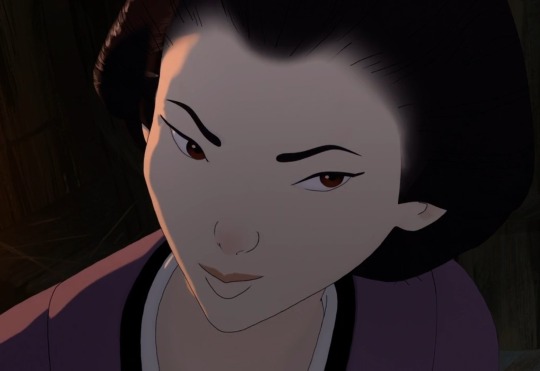
Akemi, on the other hand, intends all her sexual overtures to have a fixed purpose. She's written as a character who prepares intensely for her ambitions. We see her revising a written speech before arguing her bit to her father, switching to appeasing to his fatherly side by playing the "naive daughter" to get him to agree with her and Taigen's engagement. In ep 4 we see her curating an impish, adulant image of an innocuous sex worker before making Mizu's acquaintance, intending to lower her guard enough to subdue her and bring her to Taigen. She finally goes on imbibe the perfect subservient, loving wife to finesse Takayoshi and thereby solidify her say among other exponents in the Shogun's family.

Her mind is like a self gearing machine in terms of playing pieces to give herself a fighting chance. Sex is a part of this rematch. With sex as a means, it's arguable if she genuinely feels pleasure in the process but she ensures that she's able to pleasure her partners to an end that serves her. With men, it's always about massaging their ego. With Taigen, Akemi initiates sex to be able to coax him into focusing on her and saving their engagement instead of letting him fixate on his recent loss of his hair and honour. In the brothel, she regales Watari, a man who's never won a fair fight, and has become impotent due to his weight, by appealing to his poetic side and using it to flatter him to ejaculation. With Takayoshi, a man subdued by his mother for his stutter and meek ways, Akemi admits to finding his speech impediment endearing, apologising profusely to resume her submissive position as his wife and proceeds to consummate their marriage while encouraging him to recite poetry.
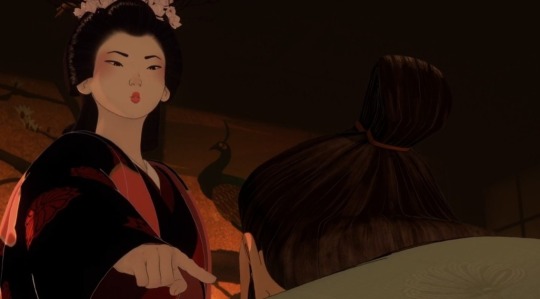
Like Mizu, Akemi's curious about sex in itself and went against her teacher's wishes to explore erotic literature. She's well versed with sexually coloured poetry and easily weaves sex into conversation, using it to talk her partners to orgasm. She has a varied understanding of poetry, an art she uses as a weapon to flatter men, citing Shōtetsu, Minamoto no Shigeyuki and her favorite, Ono no Komachi. A waka poetess writing chiefly in matters of melancholy and passionate love. She's also skilled in all manner of art that are intrinsically ornate but are notorious for being feminine or are used to entertain men such as poetry, koto playing, dancing and calligraphy. An average man would deem such arts lowly but he doesn't consider that such arts can be used to easily lower his guard to his very vanquish without him ever doubting that there was even a ploy in the first place. Akemi wields these talents to her advantage. Sex and fine arts are only a few of the weapons in her arsenal.

Strangely enough, it's not exactly touched upon what Akemi actually finds desirable outside of what she must do to get her way. It can be guessed that she'd be disarmed by anyone who lasers through her simpering girly act, someone who can be valiant and honourable, someone who doesn't weigh virtue and strength through the prejudice of gender, someone who's able to value her in all her intricacies instead of pushing her to be a proper wife or improper whore.
Likewise, I can imagine Mizu wanting the same degree of acceptance. Someone who nurtures her feminine side without alienating her masculinity. Someone who doesn't demonise her appearance or consider her an anomalous product of two races. Her ideal type hasn't been detailed but her bar was really low. She didn't care about Mikio's age or social status or wealth. Akemi was also shown to having a narrow criteria for marriage, preferring Taigen solely because marrying him meant staying in Kyoto, near home. For both Taigen and Mikio, they benefitted from the unhinged cruelty other men could afford, appearing decent by comparison because they did the bare minimum of asking for consent.

It is still very nascent as to what Akemi and Mizu truly desire. Mainly because there hasn't been much room for individual desires. Akemi was already "past her prime" and evading marriage was no option as it was a decision sealed in stone by a girl's father the moment she hit puberty. For a time where women had little say in who they married, managing to get engaged to Taigen was a feat in itself. Her attempts to escape the arranged marriage with the Shogun's son was rendered fruitless by Taigen, Seki and in great part, Mizu. Akemi finally embraced her new married life, making peace with fighting within her means instead of trying to run away from them. This leaves a lot of room for what she'd eventually want for herself in the future. We know a part of her wished to leave with/without Taigen to live on a farm in Kokura but she's still too early in her journey of knowing exactly what she wants but she's constantly figuring things out.
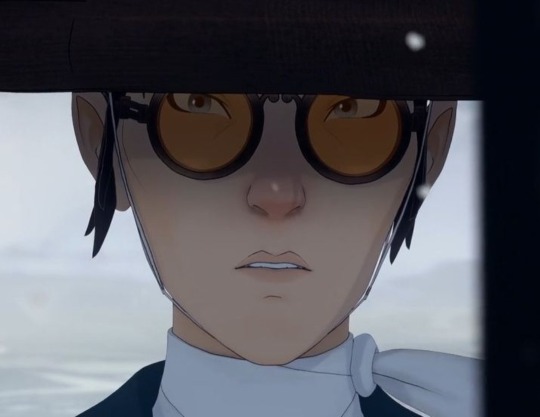
Similarly, Mizu didn't have a say in her former marriage either but she was ready for the obligations it would impose on her, aware that she'd be compelled to conceal a part of her that men wouldn't welcome in their wives. Her masculine side that is capable of fighting like a samurai. Her sword of a soul. With her sworn revenge, aversion to all forms of intimacy and commitment to playing the part of a man, Mizu has become a vessel for all the ill will, prejudice and poor decisions men imposed on her. She doesn't have the liberty to bare herself and engage in fulfilling her desire as she's discovered to like it but the more characters she interacts with, we as audiences can observe seismic shifts in her perception of herself through the people she meets. These experiences serve as guiding lines for developing future desire. Of independent choice.
#blue eye samurai#mizu blue eye samurai#akemi blue eye samurai#blue eye samurai mizu#bes akemi#blue eyed samurai#blue eye samurai akemi#blue eye samurai analysis#netflix bes#netflix blue eye samurai#bes netflix#mizu#akemi itoh#akemi ito#mizu akemi
166 notes
·
View notes
Text
Names and their meanings - Blue Eye Samurai
Mizu- means water; this can represent that Mizu travels across the waters to find her biological father to kill him. Can also represent her flexibility within her identity. There is nothing solid. Mizu has lived her life as a man and a woman. She is both white and Japanese. Mizu draws the line between a swordmaster who appreciates the art of the sword and a person stricken with grief who will stop at nothing to achieve the vengeance they so crave. During the play, Mizu was both the ronin and the onryo. There is not one identity you can give to Mizu because she is as flexible and changing as water. After all, you can't keep water in your hands forever the same way you cannot tie down Mizu to one identity.

Akemi- translates to Bright Beauty. Akemi is mentioned to look nothing short like a princess even when her kimino was covered in dirt. The bright in bright beauty could also be taken as intelligence. Akemi throughout the series becomes knowledgeable, and well tempered. Fitting of a wise princess. You could also argue that bright could refer to her ambition to be great.
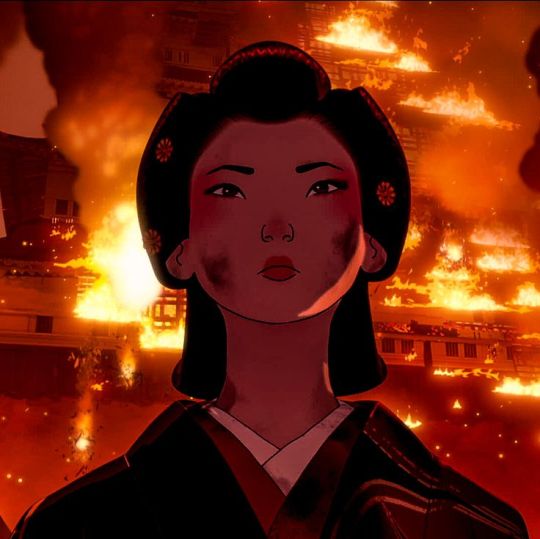
Taigen- means strong, fearless, and warrior. Taigen is regarded to be a strong samurai throughout the series, with Mizu even acknowledging his strength. He definitely fits into the warrior archetype. Always wanting to restore his honour, appreciating the art of the sword, physically strong, coming from a humble background, etc. Taigen is fearless to an alarming degree. Of course, he's brave but it can be deadly to the point of recklessness. For example, he was confident he could beat Abijah Fowler's gun with his sword. Not even considering the advance technology of guns.
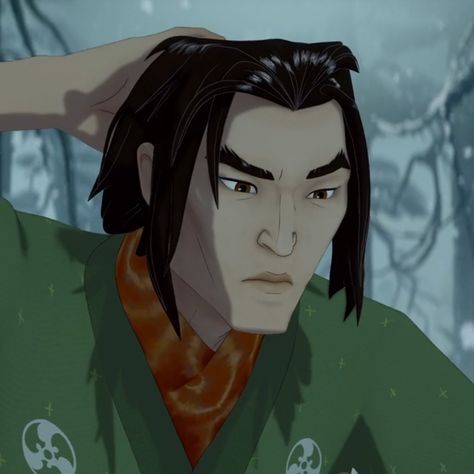
Ringo- means apple. This one kinda stumped me, but I have an explanation that I hope makes sense. There's the saying, "The apple doesn't fall far from the tree." Usually referring to children being alike to their parents. In the beginning, we see that Ringo is helping out with his father's restaurant. Cooking noodles and serving customers. After seeing Mizu's showdown in the restaurant, he's inspired by her. Wanting to be her apprentice because Ringo wants to be a great samurai. In the season finale, Ringo is led to believe that Mizu has died. Master Eiji takes Ringo under his wing to learn the art of sword making. I believe his name refers to his willingness to always learn. Ringo learned from his father, Mizu then Master Eiji. (Taigen even teaches some stuff about fighting) I'm sure that him learning from all these people will lead up to something. Maybe Ringo will become a Jack of All Trades.
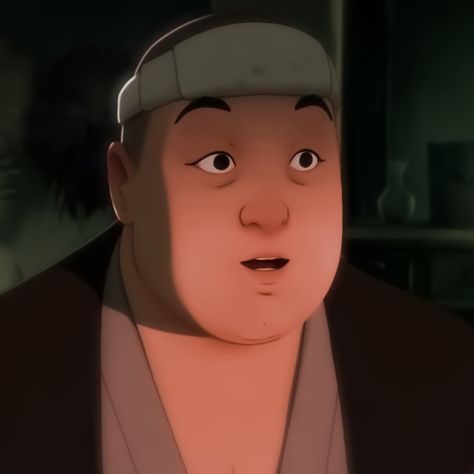
#blue eye samurai#mizu#mizu blue eye samurai#akemi#akemi blue eye samurai#taigen#mizu bes#ringo blue eye samurai#character analysis
125 notes
·
View notes
Text
Blue Eye Samurai: regarding Mizu’s “plot armour” or her “ridiculously over-powered” abilities.
“Mizu is way too overpowered, it doesn’t make sense.”
I feel like a lot of people don’t realize just how much the mind over matter mentality plays a roll in Mizu’s “abilities”. Mizu isn’t the best because she’s physically the strongest, or had the best training, or the most experience, or whatever. Mizu is the best because she has single-minded focus and immense tenacity that borders on psychotic due to how intensely dedicated to revenge she has been for almost all of her life. All the years she spent training, all the time she spends taking out enemies, she is being driven by single minded focus and iron willed determination that never wavers. She has been sharpening and honing not just her body, but her mind, for exactly this. She has dedicated her entire life to her quest for vengeance, and in her own words, there is no room in it for anything else.
People also seem to be making a lot of assumptions about what kind of training and how much training Mizu has or has not had. As the audience, we’ve only been shown bits and pieces of Mizu’s past, which includes her experience learning martial arts. Asking shit like “how is she so good with a sword if she’s only self taught?” is like asking “how can she read and write if Master Eiji is blind?”. The answer is that Mizu has obviously learnt these things from more than one source, but documenting her entire education in detail doesn’t exactly serve a purpose to the narrative. We are explicitly shown in one of Mizu’s flashbacks that she’s been practicing with a wooden sparring sword since she was very young. It’s actually her child self that we see in that brief particular flashback. Not her teen/tween self, her child self. She’s also following the movements and instructions of an older man that is clearly a skilled samurai or warrior of some kind based on context (which y’all love to ignore). Besides, who else would want/need a sword from a master sword-maker besides an expert swordsman? How many skilled fighters from all over Japan have come to Master Eiji’s forge hoping for a blade, and wait with nothing better to do but train while their blade is being made? How many of them have divulged information about certain fighting styles (like Shindo-Ryu, which Mizu was familiar with despite never having been to the dojo before). Or practiced around her and with her? We are clearly shown through Mizu’s flashbacks that receiving training from a visiting client has not been unusual for her throughout her apprenticeship with Master Eiji, and her little spar with Blood Soaked Chiaki was no one time event. Yet Mizu is never given the benefit of the doubt by the audience, despite context clues indicating that she should be.
“Taigen has way more training in an actual dojo, so why is Mizu better?”
Whereas Taigen, while he was determined to become more than just a fisherman’s son and was driven to rise through the ranks of the Dojo and become a skilled samurai, did not have that same desire or determination to hone every part of himself to be the most deadly weapon he could possibly be, like Mizu did. Taigen believes in the samurai code of honor and upholds it in his own way (preventing him from learning how to “fight dirty” so to speak) and he also had a life outside of his training (he had a social life, he drank, he partied, he snuck around a lot to see Akemi presumably, etc). In fact, we actually never see Taigen practice, train, learn, hone his skills, or anything (to my recollection) throughout the whole season, until he’s bested by Mizu in combat. I’m assuming Taigen had to work quite hard for several years to become as good as he is, but I get the sense that ever since he has been regarded as a prodigy he has allowed himself to get cocky and maybe a bit too comfortable. He has always been the best and always thought himself to be the best, so he never needed to give 150% effort when he fought. In fact, as he got older and more practiced, and it became more and more apparent how much better he was than everyone else, he probably stopped giving his 110% and allowed himself to get a bit comfortable putting in 100% effort, and then eventually 80% effort (which is part of the reason why I think he’s so pissed he lost to Mizu in their first fight, because he knows he could have done better: been less cocky, been more tactical, more driven, etc).
We also never see Taigen meditate or mentally or physically prepare himself the way we do with Mizu. Mizu will pray before a major upcoming battle, not because she’s religious, but because she’s mentally, emotionally, and spiritually preparing herself. We even see Mizu submerge herself in very cold ocean water (during the winter mind you) as a ritual/practice of sorts that serves to center herself and prepare mentally and physically for what’s ahead when she feels herself getting “too emotional” or too stressed or unfocused or even just slightly off kilter. Mizu sacrifices every part of her life, so that she can be the deadliest version of herself possible. She has no social life. She has no friends, or significant others (Mikio aside). She has no other activities to participate in, because she’s been completely alienated and thus being anything but the best is not an option in her mind because she has no options. She tried married life. She had the best possible life that she could have had as a biracial woman in Edo era Japan. She did as she was told by her “mother”. She showed her true self to Mikio, just as he desired. Yet the blood and vengeance still caught up with her. She has no other options anymore. Pursuing revenge is the only thing she knows how to do, because every other avenue in life has been cut off from her. So she has to be single-mindedly focused on her vengeance, which means being as skilled and as dangerous as she can possibly be. She has no hobbies or jobs or responsibilities beyond sword-making (which allows her to become as familiar with the blade as possible) and training herself. If she has extra time, she uses it to practice, to train, to improve, to simply maintain peak performance. Such as when she was hacking through those trees in episode 2. Afterwards, we see Taigen attempt to replicate her training (by cutting down trees with his sword). Though even then, it was more about curiosity and trying to suss out Mizu so he could gauge her skill level, then it was about actually honing his own abilities (until episode 3 when he practices with Chiaki’s broken blade). Which does count as training in its own way (assessing your enemy), but my point still stands. Taigen does not have the same unwavering focus and force of will that Mizu does (partially because he does not actually want to kill Mizu, as we do see Taigen go cold blooded with focus when he kills Heiji Shindo, but those are whole other discussions).
“Mizu just has ridiculous plot armour, that’s the real reason she survives every encounter.”
I feel like people that think Mizu has ridiculous plot armour are just not at all familiar with the Samurai or Western/Cowboy sub-genres at all, or even action as an overarching genre on its own. I don’t believe I have ever engaged in a single piece of action media in which the protagonist didn’t have “plot armour” in some way. Basically half of all male protagonists from any and all modern western action movies ever, have been way too over-powered and been able to take a ridiculous amount of damage that should have killed them multiple times over. These action heroes (who in western media are almost always cis-het white men) have ridiculous plot armour in the most classic sense. Yet no one complains when it’s a white man. Only when it’s a queer-coded biracial woman of colour. Shocking.
In fact, you could argue that every main character in every fictional story ever told has plot armour to a certain degree, because having an entire narrative revolve around one character is inherently “unrealistic” and therefore the main character has plot armour, yes? No? Yeah, that’s what I thought. Oh, and on the topic of the samurai genre specifically (and many martial arts based action media) there are certain genre specific tropes that are nearly integral to the genre. One of the most prominent being the samurai/ronin/warrior/martial arts master that is “ridiculously over powered”. It’s literally part of the genre. In fact, the western/cowboy genre is quite similar to the classic samurai genre. Now, how many westerns have you watched in which Clint Eastwood or John Wayne shoot 5+ guys with one pistol before any of the guys they shoot even get a shot off? A lot I bet. Is that not the definition of “over-powered” and “unrealistic”? Or is it just a genre trope, or even perhaps, a genre staple? No one thinks Arthur Morgan (Red Dead Redemption 2) is over-powered. No one thinks that Joel (The Last of Us) is over-powered. In fact, when the TLOU show came out, people actually complained that Joel, the fifty-something year old man that has been living in a post apocalyptic wasteland for 20 years, was not badass or strong enough (he kills dozens of humans and super zombies and he’s legally a senior). So, who is the “judge” of what is and is not realistic in action media that borders on sci-fi/fantasy based on how “over-powered” the protagonists “realistically” are?
“It’s just weird that Mizu is so powerful when other characters within the story are not. It makes Mizu such a Mary Sue.”
Okay… so, with all that in mind, let’s circle back to where I started when referring to Mizu as someone driven by unwavering determination, and how that affects her “abilities”. That facet of her personality and motivation is nothing new when it comes to the action genre, especially for protagonists of revenge storylines. Think of Kill Bill or John Wick. Why does John or the Bride keep going and keep winning even when they are constantly getting injured and always fighting. Is it because they are simply that much better than everyone else? Yes and no. No, because they are not superheroes (technically), but also yes. Because their single minded determination and need for revenge drives them to push that much harder than anyone else on their skill level. They are the best, but they win against everyone else that is also “the best” because they want it more. They need it more. Mind over matter. They are willing to endure what others are not through sheer will and pure cold rage. Mizu, Beatrice Kiddo, John Wick, and so many more similar protagonists in action-revenge narratives don’t keep winning and keep getting back up no matter how inured they get because they are just “that much stronger and more talented than everyone else”. Yes, they are extremely skilled and would probably be one of the strongest and most deadly combatants/killers in their respective universes regardless… but their refined skill and raw talent and power are not the only reason they win. Their unwavering force of will, extreme determination, ice cold fury, and single-minded focus on revenge is what drive them to be that much tougher. Their tenacity is their superpower. They want to win more than their opponent does. They need to win, because this is their one and only goal in life as of now. Mizu (Blue Eye Samurai) Beatrice (Kill Bill), John (John Wick), they all share a philosophy in life when it comes to their revenge, which basically boils down to “Either I kill you, or I die trying. There is no middle ground, there is no negotiating, no other choice, no path of least resistance, no other goal or motivation. You will die, because I ain’t fucking dying until you do.”
Mizu doesn’t have plot armour and she’s not over-powered. She is an archetypical protagonist of the action-revenge narrative and the samurai/western genre as well. She arguably even has better reason to be completing the feats that she does than John Wick or The Bride, because the medium of Blue Eye Samurai is animation and not live action, and the genre borders on magical realism far more than Kill Bill or John Wick. Now, how many anime protagonists (probably almost all male) can you think of that are “ridiculously over-powered” especially compared to any live action counterparts, but no one complains about it? Why does no one complain about it (aside from misogyny)? Because the medium of animation inherently has different “rules”, expectations, and set standards for suspension of disbelief, than the medium of live action film or television. For example, is it ridiculous and unrealistic when you’re watching a Looney Tunes cartoon and Bugs Bunny’s legs pinwheel in super-speed for 3 seconds straight before he starts running, or when he runs off a ledge and gravity just lets him hang there for a sec so he can look straight at the camera before he falls? No, it’s not “unrealistic” or emersion breaking, not even a little, but why? Is it because any of those things seem even remotely probable or “realistic”? Of course not! It’s perfectly acceptable because the medium, genre, target audience, atmosphere, art/animation style, narrative choice, storytelling style, and more, have all established that Bugs Bunny defying physics is normal in Looney Tunes, and therefore not a “plot-hole” or “unrealistic”. In fact, if Bugs Bunny or Tom and Jerry didn’t defy physics in ridiculous ways all the time, then it feels far stranger and off-beat than if they did. Same goes for pretty much all action anime. If the characters in those stories were strictly limited to what is 100% humanly possible in real life, most of those animes wouldn’t even have storylines anymore. They’d be turned into completely different content that may be unrecognizable from the original source material. Or wouldn’t even have any material anymore because all the characters would be dead after their first fight scene. So why is Blue Eye Samurai being held to a different standard?
Now, do y’all get it yet?
#long post#mizu#blue eye samurai#👏 genre and👏 medium matter👏#so does author intention >>>#if a story is telling a narrative that you personally don’t like but it is succeeding at what it set out to do that does not make it bad!!!#so sick of white boys on the internet calling any physically capable or martially skilled female character a Mary Sue#and it almost always boils down just to gender#a female character could be ridiculously overpowered but so long as there is a male protagonist that is even more overpowered they don’t ga#but as soon as there is a female protagonist with any kind of proficiency a male character in the story doesn’t have all hell breaks loose#if i hear one more man so much as utter the words ‘Mary Sue’ in my vicinity ever again i will be resorting to Mizu style conflict resolutio#men never learnt what the term ‘Mary Sue’ actually means and if you don’t know what something means then either research it or stfu#it’s such loser behaviour that shows such a pathetic measly capacity for any kind of critical thinking or reasoning much less media analysi#anyway rant over#this was sitting in my drafts#blue eye samurai analysis#mizu blue eye samurai#taigen blue eye samurai#taigen#overpowered#plot armor#media analysis#mizu bes#bes taigen#netflix bes#feminist critique#bes#blue eye samurai meta#reading comprehension#rant
21 notes
·
View notes
Text
My take on Mizu's character (+ why I don't actually want her to end up with someone at the end of the show)
Ok so, I'm going to start off with my analysis on Mizu before moving onto the possibly controversial part of my post which is: Why do I not want her with anyone?
Mizu has, obviously, a lot of trauma. Ranging from the trauma inflicted onto her because of her mixed race and around her gender and her role as a woman. And to add onto that she has ended up developing a trauma towards intimate relationships and relationships in general due to both her mother and Mikio playing a part in breaking apart her trust.
Despite what a lot of people seem to headcanon I do not think Mizu is non-binary. And before people get mad I say this as someone who is non-binary myself. Mizu is a woman. A woman who has not been able to explore who she is as a person because of the fear of being caught. I believe that deep down she holds this interal mysogyny, not because she hates women but because of what the societal standards are for them. She correlates anything with femininity with negatives (being married off, sex work, being treated as property and so on). This causes her to be reluctant in showing her feminine side, but this does not make her any less of a woman.
Next up is her relationship with revenge and positive emotional outlets. Due to her less than happy past she has formed an innate reaction to link vengence as her only outlet to some form of freedom. In the end, a lot of what she does actually prevents her own self-healing, even if the people she is out to kill do deserve to die. The thing is, she formulates her entire outward persona on these people. On the revenge she plans to take and her anger. And what I'm trying to say here is that she is not herself. In the end, her own bitterness as well as her circumstances prevent her from healing herself, prevent her from allowing her inner self to become her outer persona as well.
This leads me on to the part that may be a bit controversial. I just want to put a disclaimer that this is my personal opinion, and everyone is entitled to their own so please do not hate me for this.
Because of the many issues in her own self and in her mental stability I actually would rather not see Mizu with a love interest. I want Blue Eye Samurai to focus around Mizu healing herself. I want to see her grow into someone that doesn't have destruction and death as her core. I want Mizu to accept and heal herself, a testament that healing doesn't necessarily need to rely on others, but is also attributed to self-awareness and discipline. I feel like pairing her up with someone would kind of overshadow her personality and would actually lessen the quality of the show rather than aid it. If she is to be paired up with a character though, I personally see her ending up with a woman.
(A/N: That's all!! I hope you enjoyed and I plan on making some general headcanon's for Mizu as well, although I do tend to try to stick to canon. If you'd like to discuss or add onto my ideas always feel free to do so!! :DDD)
#blue eye samurai#mizu blue eye samurai#i love women#i love fictional characters#character analysis#headcanon
69 notes
·
View notes
Text
why mizu is, in fact, not cis
Everyone is very angry at everyone about how to see or not see Mizu’s identity; being unable to shut up, and having fixated on the show a bit, i’m excited to finally join my first to-the-death-tumblr-discourse-battle.
I'm going to use mostly he/him for Mizu, but please read the premise below. Read the colored strings of text 😭
The main argument for Mizu being a woman is that which has as its basis the fact that cross-dressing is for Mizu an external need: for one, it is a need for protection from patriarchal bonds; secondly, it is a need for independence - Akemi’s story is one of independence as well, of feminine independence, and we have more than one woman pursuing such thing; we could go on with an analysis of brothels as a feminine space, but, alas - and thirdly, it is a need of obligation: Mizu needs to maintain the masculine identity in order to attain the object of his vow.
I find, however, that while the argument stands as perfectly sound (and as canon) it isn’t exhaustive enough of the layered experience of gender in BES.
The trans coding is simply undeniable to me, whether it was intentional or not. I do not mean to say that Mizu is a binary trans man; that would be an approach as reductionist as confirming she is exclusively a woman. However, I find that some behaviours of Mizu’s are coded as dysphoric reactions.
Most of my justifications for this reasoning come from episodes 2, 5 and 8.
In episode 2,
Ringo is vowing to never reveal Mizu’s secret: “I’ll never tell anybody you’re a g-“; and as soon as he’s about to say girl, Mizu is just as ready to slice his throat. Mizu being worried about someone else hearing or witnessing the interaction doesn’t seem completely plausible to me: they’re alone in snowy woods, and, most likely, Mizu wouldn’t have confirmed time and again how readily he’d kill Ringo.
Then comes episode 5,
which is in my opinion the most layered and the most exhaustive in regards to Mizu’s experience of gender, especially regarding his experience of the feminine. First and foremost, it tells the ultimate teaching: that gender isn’t but a performance, just as the gender roles are portrayed through theatre in the episode. As for the dysphoric reaction, it's the whole thing. Mizu is miserable even when we suppose that the marriage could be a relatively happy time. That's another reason why I suppose the puppet theatre tells Mizu's internal sense of self as well (see paragraph 4).
(And, about gender being performative, see how kabuki theatre was born in the Edo period and how, before being banned from acting, women cross-dressed to play male characters, and men cross-dressed to play female characters. See “professional transvestites” trained to be prostitutes, Kagema being trained from a young age to „act" like members of the other sex; see how by the beginning of the 18th century AFAB sex workers would try to figure out a way to set themselves apart from wakashu, creating an entirely new space for female crossdressers in the adult entertainment sphere; see ukiyo-e representations - chigo monogatari and yukiyo-zoshi literature; stories by Ihara Saikaku that are full of "transgender behaviours" and more)
Back to ep 5:
1. Theme of performance
The theme of performance, which also is the one of Mizu performing femininity for Mikio (in function of the well-being of Mizu’s mother), but being at once unable to suppress masculinity as the only space in which Mizu seems to be comfortable: e.g., it’s a little detail, but Mizu’s only good in the kitchen when cutting vegetables, because comfortable with blades, certainly not with cooking; again Mizu having to perform femininity is when he does makeup to “make-up”, to soften Mikio’s spirit, who feels invalidated by Mizu’s masculinity when it starts to interfere with his pride, and such other details; I even thought of the sword as a symbol for “learned” masculinity: the first time this thought occurred was when it was characterized by sensuality in the scene where the spouses spar: “Unsheathe it. Let me see your blade;” and I interpreted it as masculinity being the only space that allows intimacy as well; then comes the time where Mizu learns he does not need a sword to fight, meaning to me that she can embody masculinity without having to prove it to others. And then comes the reforging of the sword’s meteorite to include “impurities”, and the rite that Mizu performs. I assume that “a sword too pure” is the symbol of, again, learned hypermasculinity to appease patriarchal expectations, and is too pure because it’s Mizu rejecting part of himself, trying to exclude all “impurities”, whether they are being half white, or being half woman. Taigen himself is the one to tell Mizu he can fight without a sword (ep 7, but done in ep 3 or 4 and ep 6 already), and then the situation starts to bear sexual tension, which I directly link to the sensual connotation of the sparring cited earlier up. Possibly, this particular situation could also mean acceptance of Mizu's lack of a native "sword".
2. Gender roles
But a more sound consideration is (i would like to hope so) the one about the whole marriage being told through puppets, and the puppets themselves. While they are different characters, first of all we see an inversion of gender in the roles: at first Mizu is the Ronin because he performs a masculine role of protection, an “active” role; then, Mizu’s role is reversed in function of his marriage. We see Mizu surrendering (forcibly, being manipulated) to femininity as soon as his mother guilt-trips him into marrying, and the ronin puppet assumes a submissive pose, long before the role reversal.
3. A note:
it yet does not seem to me like the role reversal is, so to say, complete: even after the reversal, the narrator tells details about the ronin that are actually details about Mizu, e.g. when the two marry, and despite the positions of the puppets match the ones of the spouses, it is said that the ronin's loyalty is no more turned towards his "path of revenge," (Mizu's) "but to his bride" - in the perspective explained below, perhaps Mizu's own femininity. Also, i find Mizu might perceive Mikio as the bride, and himself as the husband - as an argument it can't stand alone, or it would bare no strength, but I will use it in correlation with the other points made, until now and later, to argue that Mizu thinks of himself as a guy.
4. Performance of Mizu's sides, assimilable to when she has the vision of killing his white side, shortly before facing the four fangs or whatever their name was
This, and one more tiny detail, bring me to think that not only do we talk about external roles, but about Mizu’s self-perception. I'm referring to when it is said that “for the first time in many years, the ronin felt the storm rage inside him.” The storm is a symbol belonging to Mizu (literally it occurs in the first 2 minutes of the episode), and it is explicit that it isn’t something that happens for the first time, but rather returns. By this point, the gender roles were reversed, and yet it seems to me like it isn’t anymore about the marriage itself, but rather about Mizu’s hatred for and slaughtering of his own femininity, and, of course, the experience of betrayal; with his family (especially his mother, see below), and with his femininity, which wasn’t enough to keep him comfortable or Mikio on his side. (...betrayal which is also about mizu himself betraying akemi, i'd add. Mizu is justified here, but it's important to note the parallels between the two timelines i guess?)
5. That random ass baby
There is, at a certain point, a situation of peace, which I think is represented when one of the puppets is holding a blue baby (supposedly a little ronin) in its arms. I want to suppose that the baby represents newborn love between Mizu and Mikio, before it all fell apart. But the love itself is a masculine love, as we see that it is based on masculine exchanges (fighting, doing fieldwork, taming horses, riding together, whatever) and, it seems to me, assimilable to homosexuality between samurai, which was widespread (insert something about Taigen here). Also Mikio wanted to marry a bro lmao. Aside from that, on the level of Mizu’s self-perception, it might represent comfortableness, a sort of congruence, or, rather, a compromise, that Mizu is able to live in, between natural masculinity and performed femininity - opening up to show vulnerability, love fragile as a creature that cannot defend itself, innocent, naive, trusting.
6. About Mizu’s mother.
The puppet used for Mizu’s mother before the role reversal is the same that is supposedly used for Mizu after, but I latch onto a detail: the pattern on the puppet’s kimono is the same as the (real life) Mother’s kimono (see for example minute 12:30). I support this by noting the more obvious parallel between the blue worn by Mizu and the blue of the Ronin puppet, but at the same time I'm forced to note that after a certain point the mother has her own puppet. In any case, I see the mother and the feminine puppet wearing the same kimono as being about femininity, and about the mother’s betrayal of her child, rather than about Mizu herself. For one, manipulating him into marrying and abandoning the vow. But also we learn (ep 8) that the woman isn’t Mizu’s mother at all. One could discuss the reliability of Fowler’s statement, but I feel there are more clues regarding the mother’s betrayal: the episode starts with the Ronin, who feels the storm rage inside him at the killing of his lord (Mizu’s actual mother, perhaps) by the hands of a clan whose crest was the Phoenix (which I suppose are the white men, and the curse of whiteness for Mizu). I’ve thought about the four white men dealing guns (Fowler), flesh, opium (and I’m not sure what role “Violet” has in this, but I think they're the opium dealer), and thought that if Mizu’s “mother” was a substitute, the opium she smokes could point to Mizu’s potential father, perhaps even at the surrogate mother keeping contact, and at the surrogate’s betrayal at the same time. But it’s also true I watched the show while stoned, so I would dismiss this.
7. Onryo (note: characteristic in kabuki)
When the birth of the vengeful spirit occurs, I see very well how plausible it is to say that, actually, the rage that Mizu feels is feminine rage, and I agree with that. Mizu’s femininity is his rage, it is heavily related to the mother-daughter relationship, despite the fact that at a certain point the mother has her own puppet. At the same time, however, it is to me the result of the slaughtering of the performed femininity needed to respect the obligation (we remember the wedding was also to ensure the “surrogate” mother safety, especially financial, as well as to keep Mizu bound), just as accepting you’re able to fight with any tool puts an end to the compensatory movement by which you’re trying to prove masculinity to an observer (which, say, Taigen does as well, wanting to prove to Mizu he can beat him - plus, Taigen himself is the one to reassure Mizu on the complete unimportance of it, see how I read the sword symbol a few paragraphs earlier).
In this perspective, the "dye washing away from her kimono" to me means two things: that being what he is is inevitable, and that the feminine rage sets in; Mizu tries to make up for being a "demon", but in the end rejects the obligation towards his husband, and towards her mother; the pattern is not the same anymore, and Mizu is somehow more like his own person, returning on the path of vengeance, strengthened by the feminine, as the reforged sword will be strengthened by the very ritualistic yaki-ire.
--
Episode 8,
I feel, speaks instead for itself, for the dysphoric reaction is to me extremely clear. Reacting that way to being called a Miss is not a cisgender reaction. You’ll tell me: it’s not a dysphoric reaction! It’s a reaction of disgust to being fetishized for being a woman! And that’s plausible, supported by the “you just keep getting better,” with clear sexual implication, except I think that is also a fundamental trans experience and one cannot limit the way they read the scene to an exclusively feminine experience.
In conclusion,
I don’t think it might be all boiled down Mizu being a masc woman, because of the trans coding. Mizu thinks of himself as a guy. If not a guy, not a woman either. You’ll tell me: “Of course she does, because she’s grown up that way; she was forced to sustain the lie to preserve her life! It's a matter of conditioning!” And while it is true that the initial context points towards crossdressing, and not inherent feelings of gender non conformity or transgenderism, I feel that if Mizu really felt like a woman, he wouldn’t have such exaggerated reactions, and I don’t think they come from his temperament either. And it is disproved that conditioning someone to have a different sexuality or gender identity works in any way - I doubt Edo period Japan or a particular protagonist would make an exception. "But Mizu herself tells Mikio she didn't want to be a man, she had to be one!" Yes, because it is true. But it points to crossdressing. If it were aimed to explain the whole of Mizu's experience of gender in her self, it would invalidate the entirety of episode 5.
In any case, even in situations where he couldn’t be discovered, Mizu does not allow feminine terms or titles, or tries as best to stop them from happening; plus, it’s rather obvious how difficult the relationship with his body is.
While, once again, reading Mizu as a binary trans man is not enough, I feel like reading him as cisgender isn’t, either. As if, in any case, the feminine experience and the transmasculine one didn’t overlap in many aspects, also during the most tumultuous parts of transition, if pursued.
What is funniest above all is that the whole discourse is substantially useless. The layers of the show open to an infinite variety of interpretations, none of them fundamentally wrong. Mizu’s just quite literally Mizu. It’s a queer unlabeled thing and that’s it. If you take the Lacanian concept of the Real as the hole, properly uninteligible, surrounded by the Symbolic, you'll find that "Queer" is exquisitely representative of the Real, and therefore every label (the Symbolic) is reductive of the perceived experience (indeed the Real). The fundamental lesson about gender that you can derive from the show is that gender is a performative construct. What it pushes you to do is deconstruct your principles, especially if you are queer, since we are all entrapped in the modern western white need for strict labelling; that’s where this whole debate comes from, and it is, once again, pointless.
So, instead making fun of other people because of a set of pronouns, perhaps it would be better to imagine that more options can cohabit together, or that there is no need to label at all. Also be careful about accusing others of a complete lack of media literacy - you should thoroughly examine yours first.
Interesting articles i guess:
--
Algoso, Teresa A. "'Thoughts on Hermaphroditism': Miyatake Gaikotsu and the Convergence of the Sexes in Taishō Japan." The Journal of Asian Studies 65, no. 3 (2006): 555–573.
Algoso, Teresa A. "Not Suitable as a Man? Conscription, Masculinity, and Hermaphroditism in Early Twentieth-Century Japan." Chap. 11 In Recreating Japanese Men, edited by Sabine Frühstück and Anne Walthall. Berkeley: University of California Press, 2011, 241–261.
Mostow, Joshua S. “The Gender of Wakashu and the Grammar of Desire.” In Gender and Power in the Japanese Visual Field, edited by Joshua S. Mostow, Norman Bryson, and Maribeth Graybill. Honolulu: University of Hawai’i Press 2003, 49–70.
taken from this post asking about transgender men in the edo period: https://www.reddit.com/r/AskHistorians/comments/p6x4jk/comment/h9ttgv4/?utm_source=share&utm_medium=web3x&utm_name=web3xcss&utm_term=1&utm_content=share_button
As a final unrelated note, I haven’t seen anyone praise the MASTERFUL sound design
bye 🪳🪳🪳🪳🪳
#blue eye samurai#bes#mizu blue eye samurai#queer#queer coding#trans coding#mizu#media analysis#mizu gender#mizu trans man#mizu transgender#in this essay i will#mizu trans#mizu bes#nonbinary#genderqueer#transgender character
60 notes
·
View notes